#Francis seemingly have no powers with his people
Explore tagged Tumblr posts
Text
In this post, I'm going to tie numerous observations on screen together to make a single season 3 prediction
it relies on this premise, which i'm about to build a case for:
the way the characters interact with the story is informed by the mythical/historical figures they are directly and indirectly coded as, but it’s not always in the way you’d expect, and some characters are coded in more than one way. we can still use these relationships as Clues to postulate where the story might go and how the characters will interact with one another.
this is by no means exhaustive, obviously. i’ve seen people say that Crowley is coded as Jesus, Aziraphale as Mary, and numerous other figures. i’m just pointing out some things i’ve noticed that I haven’t seen brought up as often.
we’ll start with Crowley, then go on to Sandalphon and Saraqael, then Gabriel, then Aziraphale. yes, it'll all lead up to something and i chose these characters in this order for a reason.
Crowley
so we obviously know he’s coded as Ashtoreth when he dresses up as Nanny Ashtoreth in season 1. yes, we will note that in the book, it’s very vaguely implied that Crowley and Aziraphale both hired Ashtoreth and Francis
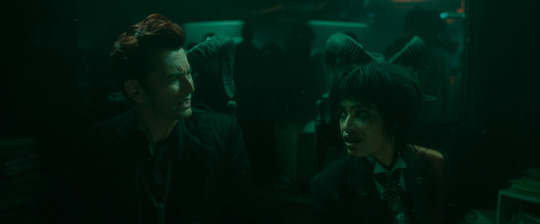
in season 2, when trying to get the deets on bae, Beelzebub offers Crowley a “hefty” promotion and then later tells him “you could be a duke of hell".
in researching Beelzebub, at some point I found out about Milton's Unholy Trinity in Paradise Lost, which includes Lucifer, Beelzebub, and Astaroth as the first heirarchy in Hell, and which has (seemingly) lent that idea to demonology in general.
Astaroth is often referred to as the "Great Duke of Hell."
so now with season 2, Crowley has been coded in the show as both the feminine and masculine demons derived from the eastern goddess Astarte.
note: coded != Crowley is literally Astaroth/Ashtoreth. it means we can infer things about the story through the coding
the obvious would be him becoming a duke of Hell somehow in season 3. i personally am not convinced the story will take that route, and it would be sad to see him end up back in hell. this coding is the least compelling for me. it could just be a Milton reference, or maybe, since at this point in season 2, we don’t know why Beelzebub wants Gabriel, this could be a Clue that Beelzebub was sincere. maybe it just shows how powerful Crowley could have been if he’d accepted the deal. or maybe it just adds weight to parallel the decision Aziraphale makes later when offered his own position of power. people have analyzed Crowley and Ashtoreth/Astarte before, and the book/show discrepancy is always brought up, so i'm ignoring that and just addressing the added layer of Astaroth coding. anyway, let's move on to the more interesting observations.
Sandalphon and Saraqael
i’m doing these two together because i’ve found what i believe to be a major connection between them based on Neil’s answer to this ask, a shared trait their mythical figures have, and Saraqael’s actions in the show.
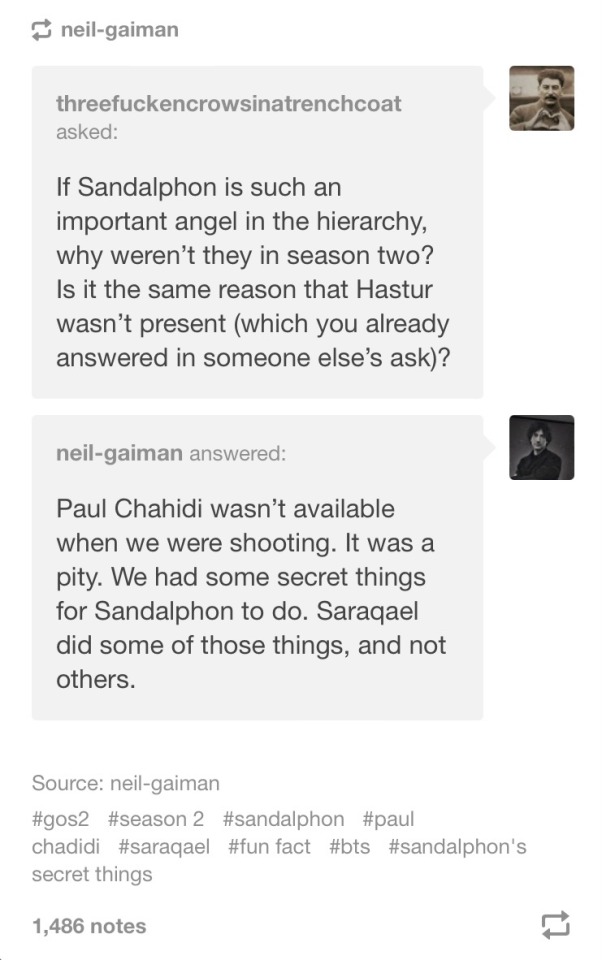
when Sandalphon is introduced in season 1, we learn that he was smiting and turning people into salt during Sodom and Gomorrah. then we see the direct connection Saraqael has with Sandalphon at the end of season 2, when Michael asks her to turn Maggie and Nina into salt pillars and her hand flys up.
but that’s not secret, is it?
you know what is, though?
the fact that she immediately recognizes Metatron in his human form, looks scared shitless for multiple shots, and then proceeds to act like it never happened when he starts addressing all the angels. she doesn’t let anyone know that she recognized him.
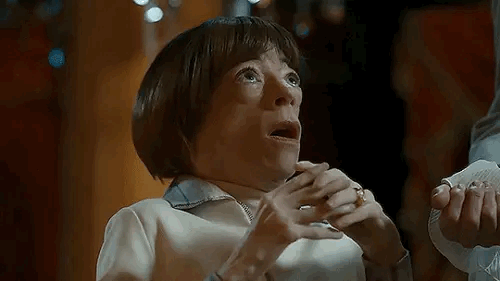
do check out this post by @most-normal-eccles-cake-ignorer with more shots and analysis of her reaction to Metatron.
still don’t believe me and think that reaction is nothing?
well, let me tell you something both the mythical figures Sandalphon and Saraqael have in common.
they both saw Metatron in his human form.
according to one source, Sandalphon was Metatron’s twin brother, and Sandalphon, like Metatron, was originally human.
in the book of 2 Enoch, Sariel/Saraqael was one of the angels who brought Enoch (human!Metatron) to Heaven.
if Sandalphon had been in that room at that moment, he’d also be secretly recognizing Metatron.
obligatory: remember what I said at the beginning of this post? we are using this coding to analyze the story and how the characters interact with it and eachother. you don’t believe that Sandalphon or Metatron were literally human at one point in GO? that’s fine. i’m just giving a reason why the author may have chosen Saraqael and Sandalphon to serve the same purpose in this scene
it isn’t crazy to think that a lot of the historical lore was used to inform the characters, and if you think it is, at least read about Gabriel first.
Gabriel
Gabriel is being coded…as the actual archangel (fucking) Gabriel. (and as Lord Jim from the novel of the same name by Joseph Conrad - the book Aziraphale glances at before choosing to call Gabriel Jim. but you can google the plot of Lord Jim and how it relates to Gabriel on your own time. it’s too much to get into right now.)
Gabriel is an archangel with the power to announce God’s will to mankind. He is associated with messages, vision, telecommunications, and revelation…
…and in the Bible he announces the birth of John the Baptist, and later, Jesus.
30 And the angel said unto her, Fear not, Mary: for thou hast found favour with God.
31 And, behold, thou shalt conceive in thy womb, and bring forth a son, and shalt call his name JESUS
Luke 1:30-31
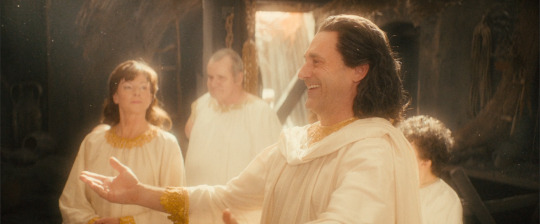
"hey Sithis dude you will not believe this… God now grants that you may conceive seven more children…yippe!!”
let’s get back to that thing about him delivering messages and revelation though.
Gabriel starts off season 2 carrying a box to the book shop (that we think was empty but later find out had a fly in it as well as a message scrawled on the bottom about where his memory is)
he also tells Aziraphale that something terrible was going to happen to him so he had to give him something. you can take that as being the fly, and consciously it probably was, but throughout season 2 Gabriel is unconsciously and unintentionally giving other people messages.
ex.
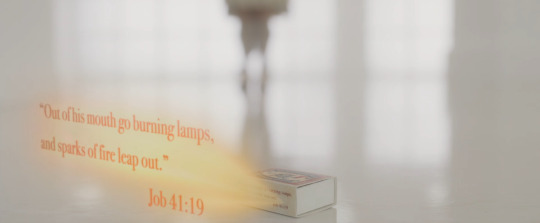
technically, a message “delivered” (dropped) by Gabriel, found by Muriel
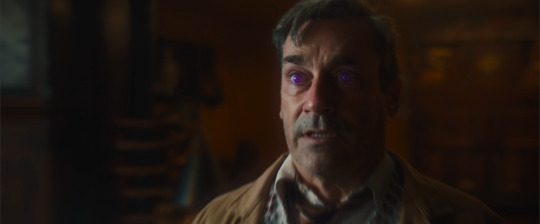
after Crowley not-so-nicely commands Gabriel to remember, Jimbriel says, in a voice that shifts to sound like God’s voice, “I remember when the morning stars sang together and all the angels of God shouted for joy." Crowley recognizes this as what God said to Job, and then another flashback of Job begins.
later, during another vision caused by Crowley mentioning the word tempest: "There will come a tempest then darkness and great storms and the dead will leave their graves and walk the earth once more, and there will be great lamentations... every day it's getting closer."
in the Hebrew Bible, Gabriel appears to the prophet Daniel, and explains his prophetic visions. in Good Omens though, Jim IS the prophet having prophetic visions through Gabriel.
when in the book shop with Aziraphale, Jimbriel starts to hum every day, which is what causes Aziraphale to search down the pub with the jukebox playing that song on repeat. we know from what Terry and Neil have said about every day that it’s the song of the apocalypse, but none of the characters know that, Gabriel included.
what does a song do?
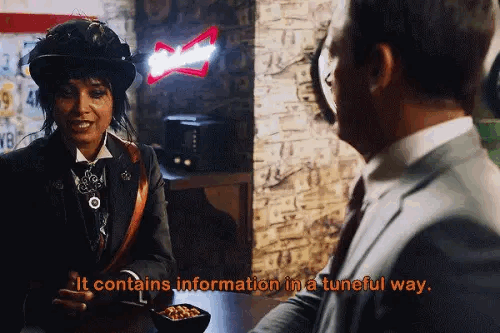
each message the archangel of (fucking) messages delivers is unconscious. not how you’d expect him to live up to his name, right? of course, if they are actually God’s messages, it makes sense that they’re useless, vauge, and well, ineffable. one last thing: spiritually, Gabriel’s messages and prophecies are often believed to be delivered through dreams (or in other words, the unconscious)
edit: this post by @noneorother actually inspired me to look at the mythology of archangel Gabriel, so it’s crucial you check it out. i’ve also seen a post somewhere that posits Gabriel shouldn’t even have some of the memories that go by really quickly before the flashbacks of him and Beelzebub, but i lost the link to it.
edit II: just wanted to add this post by @drconstellation, which analyzes the symbols coded into Jimbriel's clothing.
Aziraphale
it’s hard to ignore the fact that Aziraphale’s name is similar to Raphael, and that we’re missing an archangel Raphael. i’ll link some analysis on the meaning of Aziraphale’s name and share a quote from Terry, but this has all been said before. i want to look at who Raphael is mythologically to see if there’s similarities in Aziraphale’s character, and i also want to see if we can find out the relationship between Gabriel and Aziraphale, and why the latter was a suitable replacement.
Terry said about the name's origin:
"It was made up but... er... from real ingredients. [The name] Aziraphale could be shoved in a list of 'real' angels and would fit right in..."
For instance, Islam recognizes the Archangels Jibril, Mikhail, Azrael (see also the annotation for p. 9 of Reaper Man ), and Israfel (the subject of Edgar Allan Poe's well-known poem of the same name), whereas from Christianity we get such names as Raphael, Gabriel, Michael, and Uriel.
the excerpt above was taken from here
NOW that that’s out of the way, who is archangel Raphael, the mythical figure?
Raphael’s name means “god heals.” it’s believed he helps people heal and overcome their struggles spiritually, physically, and mentally, and that he protects people on their journeys. he’s also considered to be the angel of joy, love, marriage, matchmaking, and travels.
as an example, in the Book of Tobit, God sends Raphael on a journey with a man named Tobias so that he can meet and woo his future wife. Raphael is also sent to heal her and Tobias’s blind, ageing father.
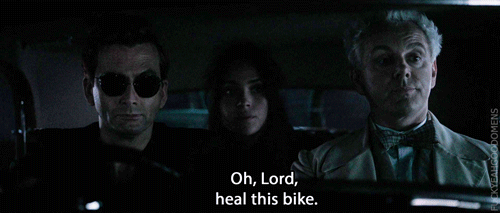
all the people and things i can count just off the top of my head that Aziraphale has healed or protected:
Anathema (healed)
Anathema’s bike (healed)
the dove he accidentally killed (technically healed by Crowley in the book)
Jimbriel (literally tells Jim he promised he would protect him)
Maggie and Nina when the demons enter the bookshop (tells them he will protect them)
bonus: in a scene cut from season 1, he stops a baby’s stroller from crashing
…and one he couldn’t:
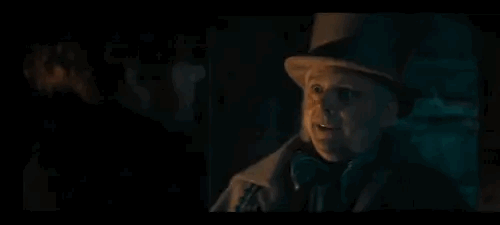
collection of gifs of Aziraphale being full of joy:
you just have to look at Aziraphale smiling, especially at Crowley...
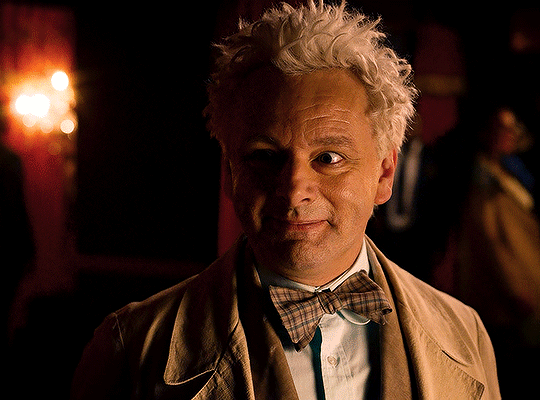
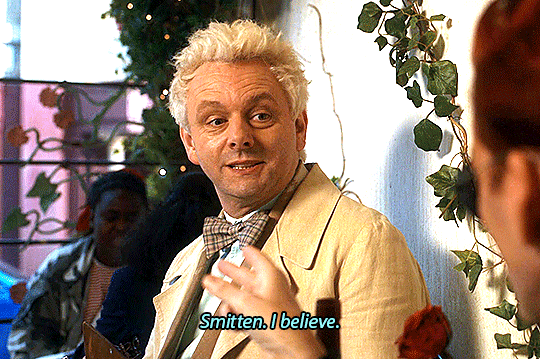

...to know that he represents joy and lo--
oh, but wait, he’s known for hooking people up, right? in case you forgot: Maggie and Nina va voom? originally his idea
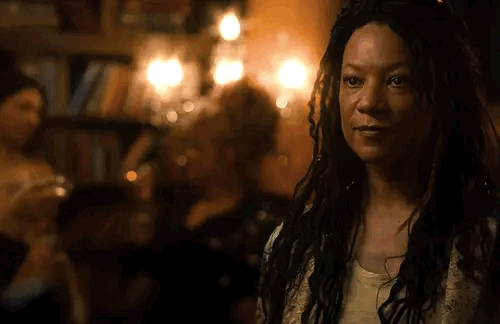
similarly to the book of Tobit story I mentioned earlier, who did Aziraphale protect on his journey to meeting his beloved?
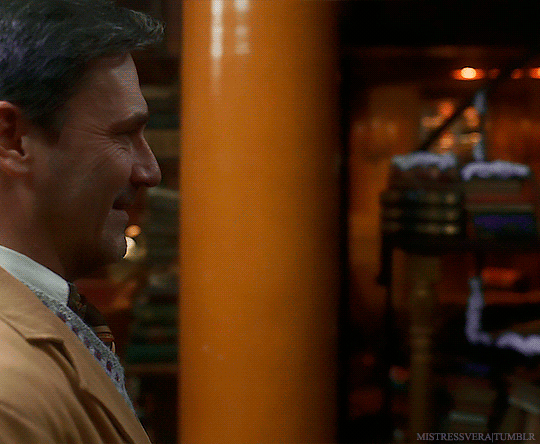
remember: the characters don't know they're being coded as anything and they don't know what kind of story they're in, so while Aziraphale didn't know he was going to be reuniting two lovers when he protected Jim, he played the role Neil made for him. it doesn't matter that he didn't know in the same way that it doesn't matter that Crowley could have (potentially) been powerful, or in the same way that it doesn't matter that Gabriel's messages were delivered unconsciously.
one more thing. Raphael heals people spiritually, physically, and mentally, right?
so is it any surprise that Aziraphale thinks he can heal the *ahem* spiritual corruption in Heaven?
we're going to tinfoil hat theory-land now ya'll, but I swear all of these observations are leading up to something cohesive...
Why did Aziraphale replace Gabriel?
i'll spare you all the long theories about Metatron's reasons, although i quite like the idea that Metatron was listening in ever since Aziraphale opened the portal to discorporate the demons attacking the bookshop, and he saw Aziraphale use his halo to declare war in order to protect Maggie and Nina. this shows Metatron that when pushed into a corner, or when it means protecting someone, he can force Aziraphale's hand...even to war.
But can we find a link between Gabriel and Raphael mythically to explain it instead?
if you've made it this far, you know i've got an answer for you. i withheld one detail about Gabriel earlier. in Christianity, he is often associated with blowing the trumpet at the end times to announce Judgment Day.
"okay, so?"
well, do you remember the quote from Terry and the excerpt from lspace I mentioned earlier? when mentioning the origins of Aziraphale's name, the excerpt mentions both angels in Islam and Christianity. the counterpart to Raphael in Islam, is Israfil/Israfel...
who blows the trumpet to signal the Day of Judgment.
"but Aziraphale wouldn't do that!"
he wouldn't intentionally do it. he's not a villain.
you remember who didn't intend to start the apocalypse in season 1, but who was there and given a role to play, regardless of whether he wanted to?
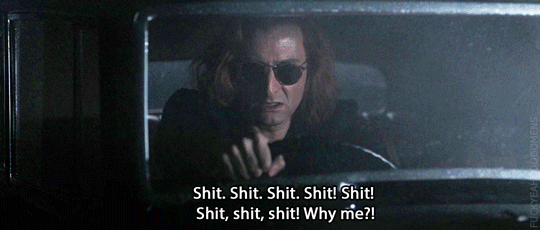
…the one who said no to heaven and hell and refused to be their pawn this time around when offered powerful positions by both?
Aziraphale, after nuking some demons with his halo, with painful foreshadowing: "I think I may have just started a war."
obligatory reiteration: the way the character-coding manifests is not literal, and it isn't always in the way you'd expect. there may be no literal trumpet. but i'm just pointing out the potential symmetry with season 1 in it being Aziraphale who "starts" apocalypse II.
one last thing: Raphael protects people on journeys, and helps them overcome their struggles — but now Aziraphale is on his own journey, and he will have to overcome his own moral struggles (ironically what Crowley helped him with)…alone.
#good omens theory#good omens season 3#good omens speculation#good omens 3#good omens analysis#good omens meta#good omens sequel#good omens spoilers#good omens#good omens clues#gabriel#aziraphale#anthony j crowley#crowley#sandalphon#saraqael#raphael
76 notes
·
View notes
Text
You Wouldn't Download a Godparent
Had an idea for a Fairly Oddparents/Mega Man Battle Network crossover.
In this universe, Timmy and his friends live in the Electopian city of Dimmsdale, and instead of magic we have Netnavis and the Cyberworld (though admittedly we do still have some magic because Mega Man is weird like that). Timmy's still a pretty average kid with a pretty lousy homelife (his parents are still That Bad. Vicky and Crocker aren't but they're still not great), apart from the fact that he's stumbled into being one of the few people to have more than one Navi.
Wanda.EXE he obtained and customized one of the usual ways, while they found Cosmo.EXE one day while they were virus busting. Poor guy was a mess of junk data and poorly installed customizer programs, seemingly stuck in a slightly unstable WindBug Style Change, and clearly in pain. They took him home, got AJ's help fixing him up, and he kind of just never left. Based on his abilities some of his data might be from the long-deleted Darkloid CosmoMan.EXE, but given he acts like his canon self there's clearly not that much left.
Wanda is Null-Element and favors Sword attacks, while Cosmo is Obstacle-Element and just throws everything but the kitchen sink.
As for some other pairs:
Timmy's Dad has a Wood-Element Navi named PencilMan.EXE. Given what he's like with other living things he's supposed to take care of (hamsters, snakes, his own son...) you can probably imagine how healthy their relationship is.
Chester has StrikeMan.EXE, a baseball-themed Null-Element Navi that belonged to his mother before she died.
AJ has AstroMan.EXE who acts as a lab assistant. Despite being Number-Element and who his Operator is he's a bit spacey and honestly not very bright.
Vicky has Vile.EXE, a Break-Element Navi who's just as mean as she is. He was actually a HeelNavi before he was customized, and they didn't actually change the design that much. Well, apart from his left arm being a massive cannon by default.
Tootie has QuakeWoman.EXE, Tempo to her friends. They're apparently massive fans of Dex and GutsMan.EXE, to the point where they've managed to customize Tempo into the second ever Panel Destruction-Element Navi (GutsMan being the first and for a long while only, of course).
Elmer has SplashWoman.EXE, who's a lot more confident than he is, likely by design. You can probably guess her elemental affinity.
Sanjay has the explosive Ballade.EXE, a Null-Element Navi who probably could've been Fire if he'd really wanted to.
Mr. Crocker has the powerful Elec-Element Navi DynamoMan.EXE. He's not as fast as you'd expect an electricity-based program to be, but he makes up for it in raw strength and voltage.
Trixie has Quint.EXE, who's actually possibly one of the earliest NetNavis to have ever been made. Trixie found his PET in a box in her attic, too damaged to turn on but its data apparently retrievable, and found what was left of Quint inside. She managed to get him fixed up and give him some upgrades to bring him up to modern standards. He doesn't remember much of his life before due to the damage and degradation. (I thought it would be cool if Battle Network Quint came from the past in contrast to Classic Quint coming from the future).
Veronica has Gemini.EXE, a Break-Element Navi with a very split personality.
Francis has OilMan.EXE, who's basically a giant blob of tar with oil drums for hands. You'd think he'd be Fire-Element, but he's actually Wood. Oil burns and came from prehistoric plants after all. He's also a lot friendlier than his Operator.
Chloe has Ciel.EXE, a Recovery-Element Navi who has the unofficial full-time job of helping her deal with her severe anxiety (that girl is a tightly wound bundle of nerves with no real outlets and you all know it).
Jorgen is a Net Official and has Signas.EXE, a Null-Element Navi who's coolheaded and calculating demeanor sharply contrasts his Operator's hot temper and gung-ho attitude.
And there's Catman.EXE, an excentric crime-fighting vigilante Solo Navi who's taken a liking to the kids.
There's also two villain groups, the newest Netcrime syndicate the Network Killers and the mysterious Project X, but they deserve their own posts.
(Network Killers) (Project X)
#fairly oddparents#mega man battle network#crossover au#you wouldn't download a godparent au#timmy turner#cosmo and wanda#netnavi ocs#timmy turner's dad#chester mcbadbat#aj fop#vicky fop#tootie fop#elmer and sanjay#denzel crocker#trixie tang#veronica star#francis fop#chloe carmichael#jorgen von strangle#catman fop#not enough room to tag the new navis unfortunately#imagine your parents sucking so bad your sentient tamagotchi have to fill in the gaps
10 notes
·
View notes
Text
All Cops Are Bastards... at least if you're Catholic
14 June 2024, 7:17 a.m. GMT
In an unscheduled announcement, Pope Francis, presumably in an effort to regain the trust of the historically anti-police LGBTQ+ community after being recorded using a homophobic slur, has declared that all marriages which resulted in a child who later became a police officer shall be annulled by the Catholic Church.
This latest papal decree comes as a shock to many clergy and laymen alike, but sources close the Pope say this has been at the forefront of his mind ever since a 2019 episode of Paw Patrol featuring a canine pope who made "undignified decisions" at the behest of the show's police dog, Chase. These decisions include using his forbidden powers to banish an unruly pigeon straight to hell after it tried eating a single grain of his holy kibble, using autotune software to exclude other animals from mass by saying prayers in a pitch so high only God and dogs can hear it, and ultimately destroying the fictional "pup mobile" in an effort to stop the mayor of Adventure Bay from codifying the Separation of Church and State.
In his statement, Francis said, "God, … in His infinite knowledge, knows which unions of Man and Woman will result in children who will later become police officers, and He does not recognize those unions in His Great Kingdom of Heaven."
The announcement may prove to be rather costly for the Church, as the Archdiocese of New York—which, since its elevation from diocese to archdiocese in 1850, has only ever had Irish-American leadership (we checked)—has released a statement claiming that, considering the long history of Irish-American police officers in New York City, the Church will have to do an intensive audit of its clergy to determine how many of them were unknowingly born out of wedlock, and thus falsely ordained. If this number proves large enough, it could lead to a significant portion of the Archdiocese's congregation learning that they, and their families, were never actually baptized. Religious scholars warn that this may lead to a schism or even the rise of seemingly oxymoronic "Irish-Protestantism," as some laymen would rather proclaim a false Pope than their own false baptism.
Francis has assured the press that he's "not worried about false baptisms at all," since baptisms within the Catholic Church need not be performed by a Catholic priest.
"The bigger concern is false marriages," says 52-year-old half-Italian professor of religious studies at Florida University College, Kingston whose name has been omitted as he asked to remain anonymous. "Think of how many people a single priest marries. Now imagine that priest's brother became a cop. Because of that brother's decision, now they're both the result of an illegitimate union, and all those people who think they've been married in the eyes of God have actually been living in sin this whole time, not to mention their children, who are illegitimate as well. It's really a cascading effect when you think about it. Our early calculations estimate that under this new rule, nearly one third of Catholics in the United States are bastards, and nearly one third of Catholic 'marriages' in the United States are illegitimate."
Some critics have drawn attention to the fact that this announcement comes just weeks after reports that the Church has purchased nearly $2.8 billion worth of stock in the U.S. wedding industry. When asked if the two events are related, the Vatican declined to comment.
22 notes
·
View notes
Text

New Era, New World, a New Wish! Hazel Wells was just your average girl. She grew up hearing stories of the old guard, the super heroes who had rose to prominence in the last World War, then as eth decades stretched on started to fall off as technology rose to meet the challenge. She always dreamed of one day meeting one of the few heroes who still remained active, never had she thought she'd be joining their ranks! That was until one day, when going to work with her father, she stumbled upon the (seemingly) long forgotten magical artifact that had once empowered the heroine Wander Gal. With but a touch and a word, young Hazel was mystically transformed into the new Wander Gal, a hew hero for he new age! How will the world react to thing young gun hitting the scene? And what will this mean for the status quo for those still around?
Muwahahahaaha! Welcome to Wishverse! Formally known as Earth E417, aka Marvel Lass' Earth. On this Earth, there was a calamity way back when, that caused a schism in the flow of magic and probably also skewed the influx of Wonderstones/Wonderworlders that visited the planet. This caused the Glamazons to (seemingly) be destroyed, leaving behind one lone artefact that held their collective power. This is the item that Sharron Karter found and used to become Wander Gal back in the day, but after her (death? retirement?) STAGE took possession of said artifact, and being unable to unlock it's powers, set it in their Vault.
As a result, WWII was a bit quicker, since there was less magic being tossed around. Thus, Albert Crocker was able to work on his Super Soldier serum better, using it on his wife Ada, and eventually a perfected version that was used on his granddaughter Maggie (Marvel Lass). But also as a result, there's less super heroes in the world. The Crockers are the main source of heroic forces in Canada.
Super Sonic grew up as STAGE's poster child for heroics, but hit huge burnout when he entered his later teens and dropped out of the public eye for several years before showing back up as a loose association to the European organization Paladin. He struggles trying to stay out of the public eye, especially with his more self destructive antics, which really makes one wonder how he and his civilian boyfriend Francis James (secretly the criminal Bull-E, associated with the international group BRAT) went so long not realizing who the other really was.
STAGE is the main source of heroics and tech in the Untied States (their main competition being the private commercial company DimmaCorp). Trisha Tang grew up with the remnants of the old guard, and had hoped to reintroduce young heroes to the world, but sadly only came into power after Sonic's self destruction. She made the choice to revive the Wonderworlder in stasis STAGE had on hand, and virtually adopted the young Chloe Carmichael as she helped guide her into being the new poster child for heroics, Powergal. Chloe is younger then Sanjay and Maggie in this case, since she was woken up later, and feels even more alienated from the people she's meant to protect.
STAGE also has several funders and subsidiaries, one of which being The Gallifax Institute, where Hazel's father works, and where the Vault holding the Wander Gal artefact was housed (amongst other things). Hazel went to work with him one day, got separated, and found the artifact which responded to her. Thus she became the new Wander Gal, and it's a race to try to guard her secret identity, make friends with the other heroes, and save the day.
Also points to note (that I have figured out so far...sorta):
Chester is most likely a member of BRAT
DimmaCorp and West Industries are also big name companies
PROTECT and Paladin are one entity (PROTECT might be Canadian)
There might be no Cleavelandlantians? Or they're completely cut off from the surface world (maybe they're replaced by Kennueth's people...)
Hazel IS 10, but since she Shazams/She-Zows into Wander Gal, she ages up to late teens/early-mid 20s to match the other super teens
And to round it off, here's Powergal's full bodied art;

Happy FanExpo Canada Weekend! lol
#my art#digital art#fairly odd parents#fairly oddparents#superverse#superverse: wishverse#not to be confused with wishstuck lol
16 notes
·
View notes
Text

The Relationship Between Brothers - A Look at the Collingridge Brothers
While Francis Urquhart is the protagonist of the story, his two unspoken victims Charles and Henry Collingridge are not to be glossed over. Rather, they are characters with an impacting bond, more so than most in the franchise. So, I'd like you to hear me out as I explain the bond between Hal and Charlie.
Henry
When Francis describes Henry’s state after resigning in episode 3 of the show, he describes him as someone who shouldn't be pitied.
Not feeling guilty, I hope? If you have pangs of pity, crush them now. Grind them under your heel like old cigar butts. I’ve done the country a favour. He didn’t have the brain or the heart or the stomach to rule a country like Great Britain. A nice enough man, but there was no bottom to him. His deepest need was that people should like him. An admirable trait that, in a spaniel or a whore. Not, I think, in a Prime Minister, hm? And we've done him a favour too, if he did but know it. He was in the trap and screaming from the moment he took office. We simply put the poor bastard out of his agony. After life's fitful fever, he sleeps well.
It should also be noted that when saying these lines, Francis is relieving himself in the bathroom and washing his hands. This is part of his entire demeanour, he doesn’t see Henry as someone worth respecting. It's best, in his eyes, to talk about him in a place where he feels he belongs.
Henry himself is seen in this role as the nice, pleasant figure, the moderate in the party. He has been in power for two years as opposed to the under ten months of the show. His political style, however, is dislikable. He is seen as too moderate, too carefree. He was elected because he was good on television, but his public speaking isn't glamorous.
“It’s rice pudding politics and there’s no energy or enthusiasm left. He’s campaigned with as much vigor as a Sunday school teacher. Another seven days of listening to him mouthing platitudes and I think even his wife would have voted for the other lot. Anything for a change.”
Henry's pleasant persona seems to be a facade, especially later in the story when he is driven more and more to depression by the events unfolding around him. The first sign of this happening is during the election, where Teddy makes a quiet apology, leaving Henry wondering why he’s apologising.
Sorry for what? The fact that my brother’s a drunk? Sorry that I’ve almost thrown away this election, put so many of our colleagues to the sword, done more damage than Goering? Sorry that you’ll have to wade through the sewage that’s about to hit us along with me? But anyway, thanks for caring, old friend.
In private when he's upset, he turns mad and frustrated. In public he's forced to put on his charming persona as required of him, something that greatly unsettles him.
He smiled broadly. It's what you had to do.
In fact, the state of Henry in private when unsettled is completely different. He is described as a “wild Warwickshire ferret” in regards to his attitude, becoming erratic. While this isn't seemingly his true personality, it's testament to the mental decline he has faced in the past years. His lack of happiness has shrouded him and tormented his very self.
Charles
Charles is the older of the two, though he is never in a good state. When he first appears in the book, he's described as such.
Collingridge was in his midfifties, looked older, worn, and hadn’t had a particularly glorious military career, two years of national service that had left him with little more than a sense of his own inadequacy in the order of life. Charlie had always tried to do the decent thing but he was accident prone. It happens when you have a drinking habit.
Off the bat, Charlie's alcoholism is revealed to the audience. His first ever action in the book is to go to the pub. Despite this, he is not made out to be a bad person. While his alcoholism is a flaw, he is told to be a “genial drunk” and all around a good person.
A note I should add is that in the show one scene depicts a newspaper snapping a photo of Charlie drunk leaning over a woman's breasts. This is expanded upon in the novel to reveal that a reporter had tried to get him drunk on purpose hoping to get something out of him, leading to him passing out, and then said reporter paid a girl to lean over him.
The Two
While Charlie is contrasted with his brother, he does not hate “Hal”. In fact, he adores him.
The book itself states that the two are the sons of a manufacturer of bath fittings, with it being the family business. The first time their background is mentioned, Charlie thinks about their father, “reproachable as ever”. Henry was clearly the favourite child for the fact he was more talented, and it seems as if their father was always pushing Charlie onto things he couldn't do. They went to the same school and had the same advantages, but Henry was the better person. Despite this, Charlie doesn’t feel any resentment towards him.
Charles didn’t feel bitter about it, was a generous soul, far too generous, and indulgent. But Hal had always been there to help when he needed it, to offer advice and to give him a shoulder to cry on after Mary had left him. […] Charlie felt—what did he feel, deep down, when he allowed himself to be honest? Angry, stinking bloody one-bottle-a-time furious—not with Hal, of course, but with life. It hadn’t worked out for him, and he didn’t understand why.
In fact, Charles is devoted to him. Even drunk, he's clambering to speak the praises of his brother. It's here where we get a second mention of their father.
“Could have taken over the family business, you know, made it one of the country’s truly great companies, but he always preferred politics. Mind you, manufacturing bath fittings was never my cup of tea, either, but it kept Father happy. D’you know they even import the ruddy stuff from Poland nowadays? Or is it Romania��?”
The impression given by Charlie of their father isn’t a positive one, and he comes across as demeaning and forcing expectations. While Henry could possibly disagree, it's likely their father was an abusive man. In the show, Charlie and Mattie come across Benjamin Landless, a character who is portrayed as brutally honest, fierce and a force to be reckoned with - utterly unpleasant to the point even Francis doesn't particularly like him. Charlie comments on him after his encounter with him.
“It's chaps like that that drives chaps to drink.”
Landless in this scene seems parallel to his own father.
Another thing to note about the two as well is that despite the fact Charlie adores Henry, it's Henry who's protective of him throughout, defending him from his charges, telling him he'll be there for him, being responsible for propping him up. It's a swap of the usual sibling roles.
The first time ever stated in the book from Henry about Charlie is a flashback to when Lord (Teddy) Williams (or Lord Billsborough in the show) asks Henry to do something about the increasing rumours surrounding his brother. Henry responds quite firmly:
“I spend half my time spilling blood, that’s the job I do. Please don’t ask me to spill my own brother’s.”
He also promises to try and regulate Charlie's behaviour but due to his job he doesn't have the time to. In the show, Charlie tells Mattie that Henry sometimes gives him £50 or £100 when he's short, which seems to an extent of what he does. He doesn't have the ability to make time for his brother, which seems to bother him tremendously. Whatever Henry is paying him clearly isn’t enough - the book notes that Charlie is having issues with his electricity bill. However it should be said that Charlie notes he is paid “when he's short”. It’s possible he's hiding his debts so Henry doesn't worry about him.
After Charlie's stint in the newspaper rumours, a photograph of him drunk is run alongside one of Henry holidaying.
The implication was clear. Henry couldn’t be bothered to leave his poolside to help.
Although it's of course clear that Henry cares about his brother and would do anything for him. When the insider dealing scandal comes out, Henry is firmly by Charlie's side.
“Sarah, I’m not going to be the one to finish off Charlie. God knows he’s been trying hard enough to do that himself, but I am still his brother. Will always be that. On this one we’ll either survive, or sink if we must. But, whatever happens, we’ll do it as a family. Together.”
The show depiction of the scene between Henry and Charlie is very different in the novels since it’s over the phone in there. However, unlike the show, this conversation is longer and shows Henry's utter devotion to his brother. In the show, the two are both collected until the end, unlike the book where Charlie is heavily crying and blaming himself for everything that happened. It should also be noted in the show that Charlie has threatened self-harm to the doctors at the clinic. It's in the novel where Henry has a giant speech.
“You have no need to ask my pardon. I’m the one who should be down on my knees begging for forgiveness. From you, Charlie.” “Don’t be stupid—” “No, you listen, Charlie! We’ve always got through our problems together, as family. Remember when I was running the business—the year we nearly went bust? We were going down, Charlie, and it was my fault. Too tied up in my politics. And who brought in that new client, that order which saved us? Oh, I know it wasn’t the biggest order we’d ever had but it couldn’t have come at a more vital time. You saved the company, Charlie, and you saved me. Just like you did when I was a bloody fool and got caught drink-driving that Christmas.” “I didn’t do anything really…” “The local police sergeant, the one who was a golfing friend of yours, somehow you persuaded him to fix the breath test at the station. If I’d lost my license I’d never have been selected for my constituency. I’d never have set foot in Downing Street. Don’t you see, you silly bugger, far from ruining it for me you made it all possible. You and me, we’ve always faced things together. And that’s just how it’s going to stay.” “I don’t deserve—” “No, you don’t deserve, Charlie, not a brother like me. You were always around when I needed help but what did I do in return? I got too busy for you. When Mary left, I knew how much you were hurting. I should’ve been there, of course I should. You needed me but there always seemed other things to do. I was always going to come and see you tomorrow. Always tomorrow, Charlie, always tomorrow. I’ve had my moment of glory, I’ve done the things that I wanted to do. While I watched you become an alcoholic and practically kill yourself. You know something, Charlie? I’ll walk out of Downing Street and be able to say bloody good riddance, screw the lot of them—if only I know I still have my brother. I’m just terrified that it’s too late, that I’ve neglected you too badly to be able to ask for your forgiveness—that you’ve been alone so long you don’t see the point in getting better.”
Henry's neglect of Charlie is consistent in his mind, and he deeply regrets it. He just wants his brother back, no matter what. He's already resigned his position, he's facing a media onslaught and calls that he might be arrested for insider trading alongside Charlie. He would do anything just for him. There's a pause and Charlie finally responds.
“Bloody idiot, you are. You're the best bruv any man could have.”
With which Henry genuinely promises to see him tomorrow. Charlie apologises for all the fuss they caused, to which Henry responds,
“To tell you the truth, I haven't felt this good in ages.”
At the end of everything is reconciliation. Henry is devoted to his brother as much as Charlie is devoted to him. And even though he’s gone through hell, he’s come out of it with a happiness he hasn’t felt in years. His occupation doesn't matter to him, because in that moment he lost sight of what was the most important thing to him - his brother.
4 notes
·
View notes
Note
Is it true that Anne of Cleves sent a marriage proposal to Henry VIII after Katherine Howard’s execution? If that did happen, then I don’t know why people give Jane Seymour flack if Anne’s thinking of marrying a guy who’s judicially murdered two wives, especially since Katherine Howard used to be her lady in waiting.
✨ terfs/zionists fuck off ✨
not exactly…
as darsie summarises: “katherine howard was beheaded on 13 february 1542. between late january and late february, anne’s brother and several other german princes drafted letters to henry. the aim was to encourage the english king to take anne back. however, francis suggested to wilhelm, via ambassadors, that the letters not be given to henry just yet”. it seems like anne’s circle was hoping or assumed henry would take anne back around the time that katherine was arrested. no formal proposal was extended, however.
in november, following katherine’s arrest, jeanne d’albret commissioned a personalised book of hours as a gift for anne of cleves — which heather darsie speculates was in the assumption that anne was in expectation of a betrothal: “a book of hours […] was a common gift for new brides. jeanne, as a dutiful sister-in-law may have been giving her books as a wedding gift in anticipation of anne’s remarriage”. around the same time, katherine was worrying the council with her self-harming behaviours: “she refuses to drink or eat and weeps and cries like a madwoman, so that they must take away things by which she might hasten her death”.
in early december 1541, while katherine languished in syon, henry’s hunting trip prompted one jane rattsey to speculate that he was using the hunt as an excuse to be near to anne: “what if god worketh this work to make the lady anne of cleves queen again?” meanwhile henry “personally authorised torture to be used on the two friends [dereham and davenport] on 6 december” (russell). mere days after dereham and culpeper were executed, on december 12th, southampton sent a letter to henry in support of anne: “he [the cleves ambassador] said his credence was to seek to reconcile the duke’s sister with the king and on december 13th, cranmer wrote that “the ambassador of cleves brought him letters (enclosed) from [olisleger] commending the cause of the lady anne of cleves […] the cause was the reconciliation of the king with lady anne”. around the same time as jane parker’s nerves had collapsed and henry had sent his own physicians “to nurse lady rochford back to health to secure her execution” (russell), the cleves ambassador met with the privy council and “prayed them [to find] means to reconcile the marriage and restore her to the estate of queen”.
so the cleves delegation clearly made some bids for henry to remarry anne, and her social and familial circle seemingly likewise wanted anne to be restored to henry’s wife… but it’s not clear how much this was directly motivated by anne. what we can say is that anne visited henry for new year’s. she gifted him crimson cloth, and darsie also points to a book of hours given to henry by anna, “in which she wrote, ‘i beseech your grace humbly when ye look on this, remember me. your grace’s assured anne, the daughter of cleves’. the date when anna gave henry this gift is not recorded”, but darsie is suggesting anne gave it to henry around this time. meanwhile, katherine spent new year’s at syon, “her mood swinging between terror, depression and forced hilarity” (tallis).
much of this was international murmurings, too. marillac now praised anne as beautiful and patient. in late january, katherine was charged with high treason. meanwhile, in france, “a declamation was published aimed at henry and the privy council about the treatment of anne”, written by john of luxembourg, titled ‘the prayer and remonstrance of the high and powerful madame marie of cleves, sister of the highest and most powerful lord, the duke of jülich, of cleves, and of guelders, to the king of england and his council’ (mistakenly calling anne by her mother’s name).
considering the confusion surrounding katherine’s sudden disgrace — as henry was careful to not let information get out, as evidenced by the ambassador’s erroneous reports — and anne’s assumed superiority over katherine (which anne herself supposedly flexed the previous year, according to darsie)… well, it doesn’t surprise me that this conclusion was reached. henry very firmly rejected anne, however, so it was for nought.
8 notes
·
View notes
Text
a random sampling of the Metal Men and Nightwing (and Power Girl) of the Tangent Comics through the decades
The Nineties- Metal Men #1, Nightwing #1, Nightwing: Night Force #1, Power Girl #1
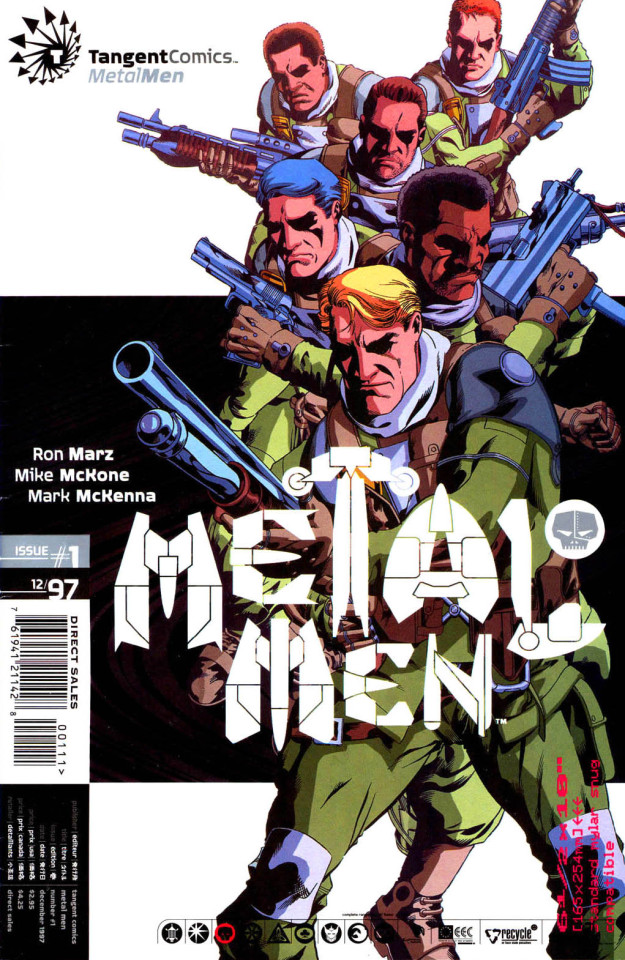
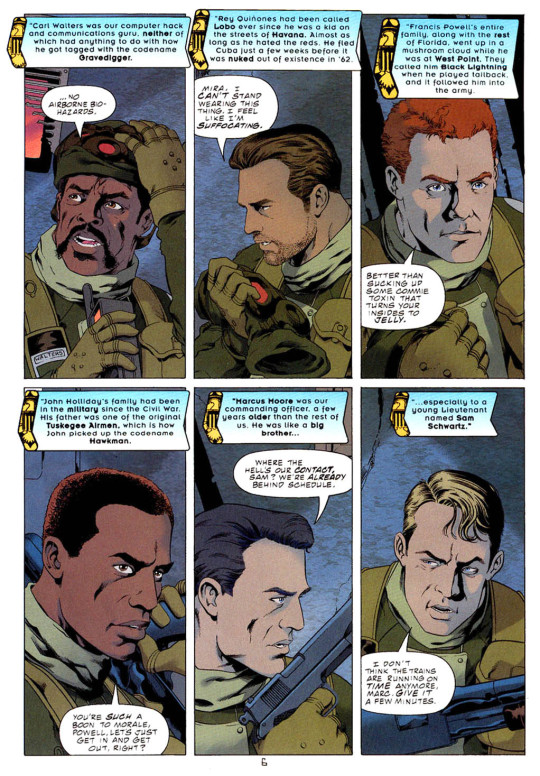
The Metal Men are the movers and shakers of the Tangent Universe, at least, they were in the first couple waves of the comics. Comprising a team of six who were operation in the late 60s during WW3, they comprised six members (seems to be a running theme in this world). Their final mission went a bit wrong, and the team broke up. Three of them operate out in the open, with Sam Schwartz becoming President of the United States, John "Hawkman" Holliday acting as his Chief of Staff, and Rey "Lobo" Quinones working spec ops. On the other side of the equation tho...
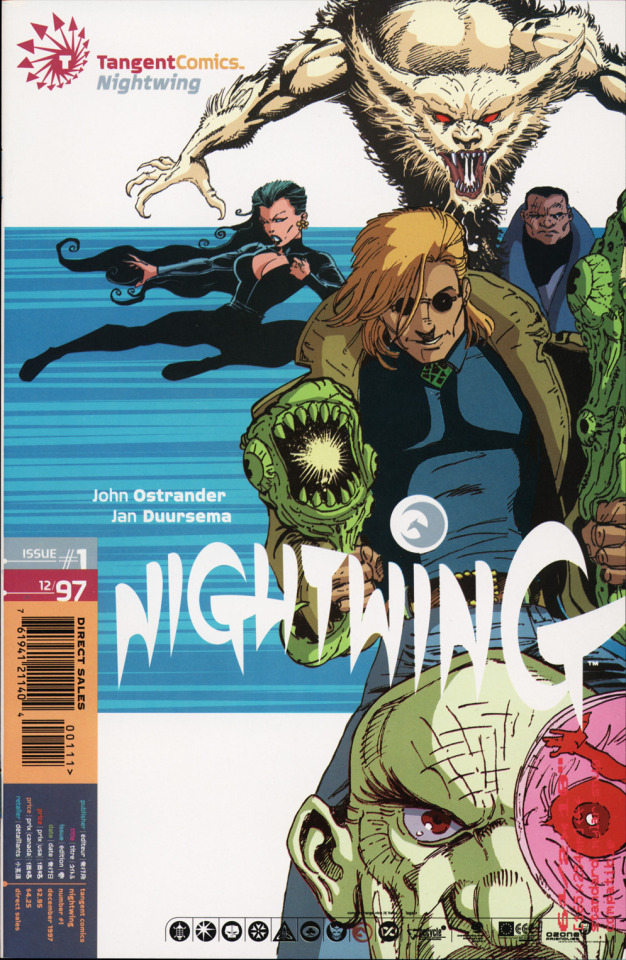
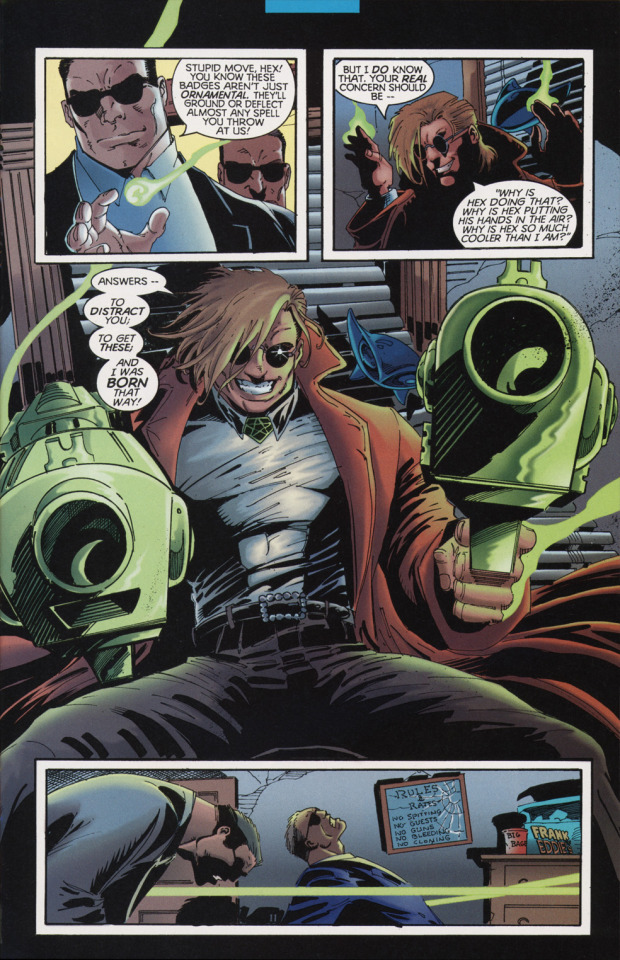
...was Nightwing, the shadow government, created to manage the world's metahumans from behind the scenes. Marcus "Deadman" Moore lead them, aided by Francis "Black Lightning" Powell and Carl "Gravedigger" Waiters. Gravedigger would also head up a team of unruly agents who believed themselves to be subverting the organization, but were instead unwittingly doing the jobs not even the 'normal' Nightwing operatives wanted to do. They were Wildcat (who transforms into a beast upon hearing the word "Shazzam!"); Hex, with his familiar Nightshade and dark arts; Black Orchid, a witch who used tantric energies to power sadistic spells; and The Creeper, who could trap and use peoples' souls to his own end.
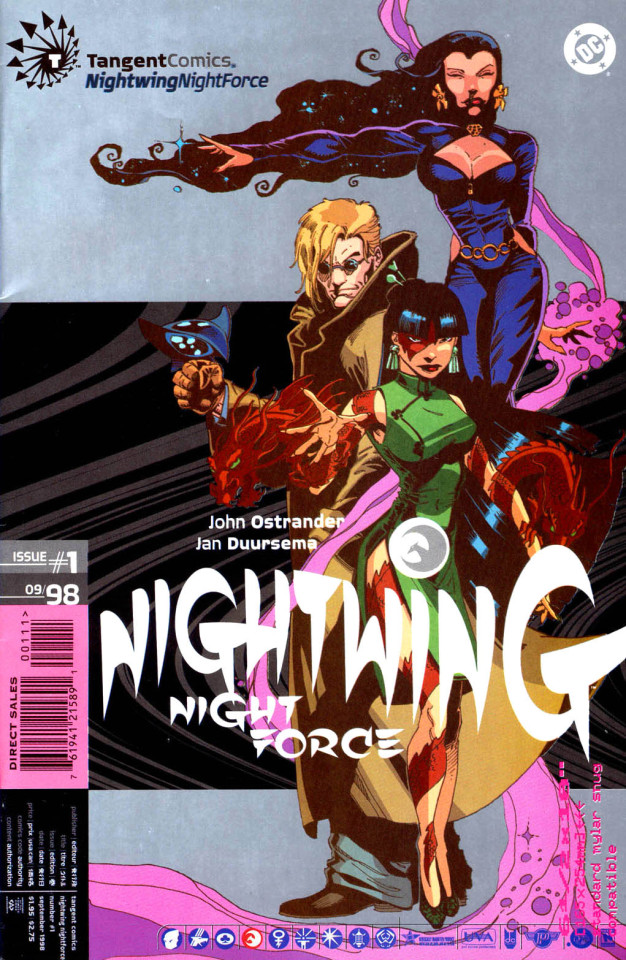
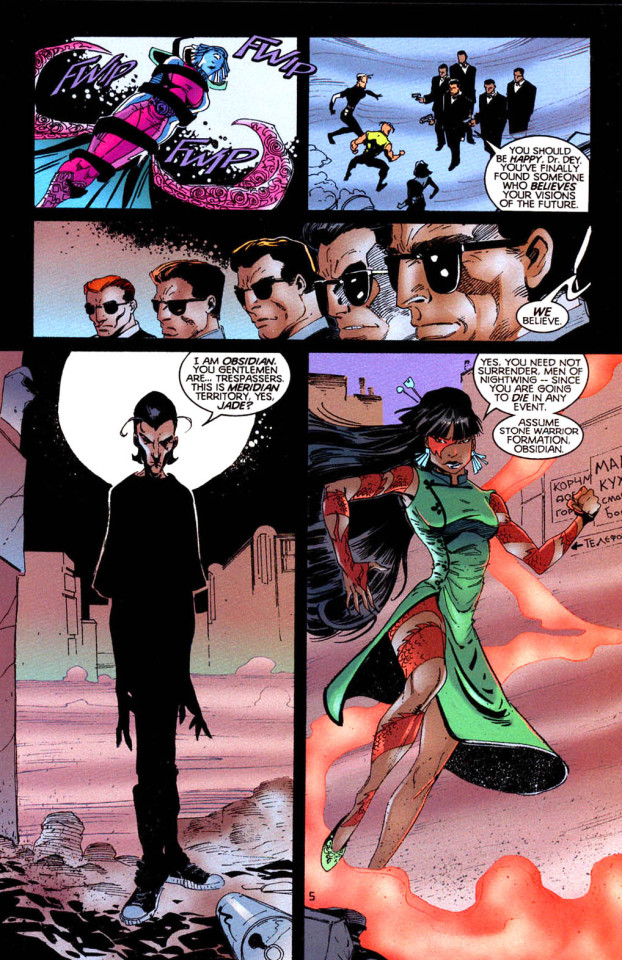
Across the pond, "Meridian" operated out of Eurasia, serving as the old world analog to Nightshade. It had many operatives and leaders, including the ancient immortal Vampire warlock Joseph Stalin (no, really), but its two top agents being Jade and Obsidian, who would often work with either the Metal Men or Nightshade as befitted their needs.
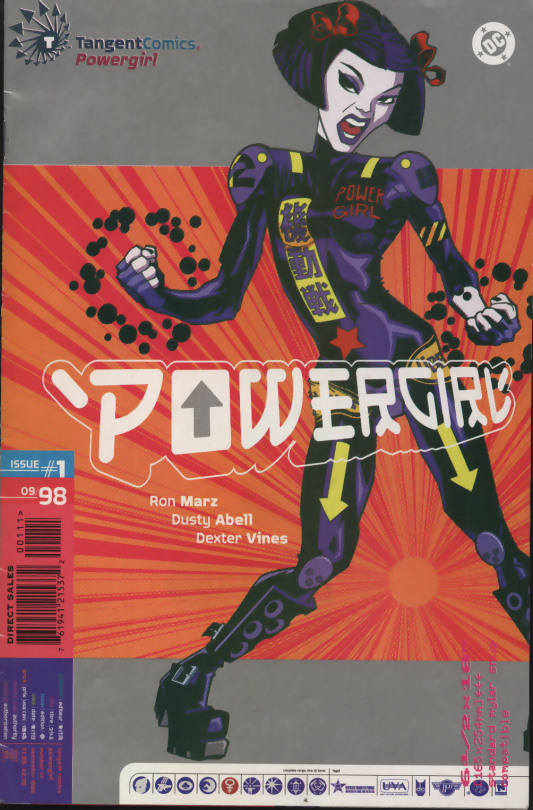
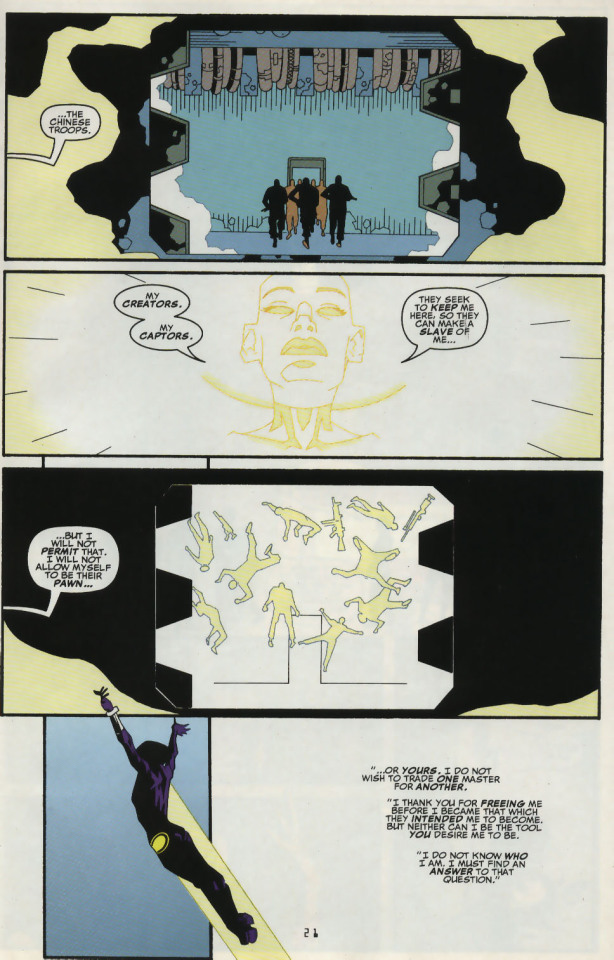
All three of these forces, the Metal Men, Nightshade, and Meridian, came together, both co-operatively and at odds, when China perfected its super soldier program and engineered Power Girl. Everyone wanted to be the ones to "rescue", and therefor take control of, the new metahuman, but she had other ideas, promptly displaying her seemingly limitless power and taking off to figure out what she wanted to do with her life on her own terms.
The Aughts- Superman's Reign
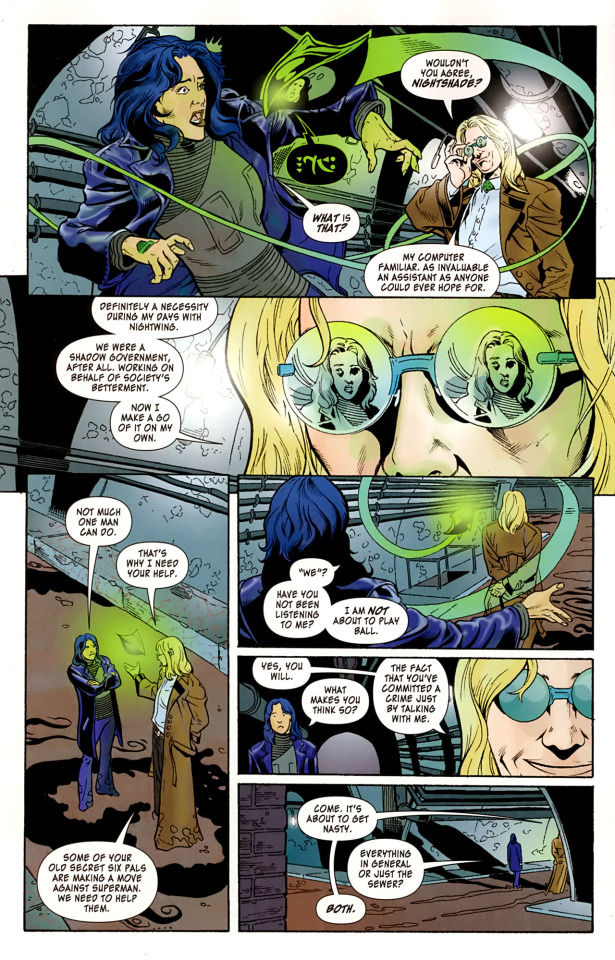
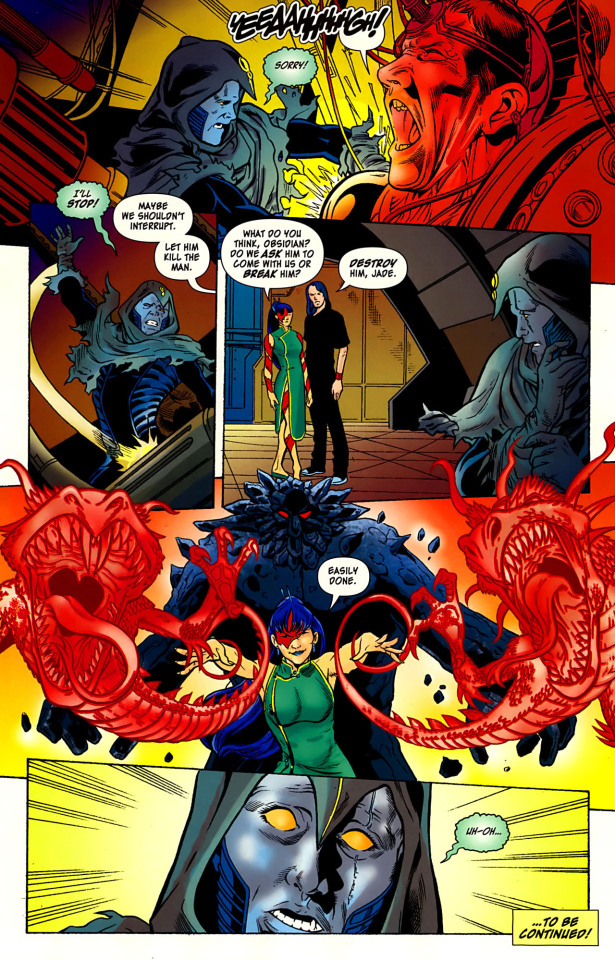
Ten years later, during the reign of The Superman, all these players were in a very different game. The Metal Men were no more, The Superman having dismantled all the world governments during his bid for power, and Nightshade was largely disbanded. Hex had joined the resistance and eventually became a member of the Outsiders, the successor team to the Secret Six, while Jade & Obsidian worked as enforcers for The Superman, ever the ones to work for what they deemed to be the winning side.
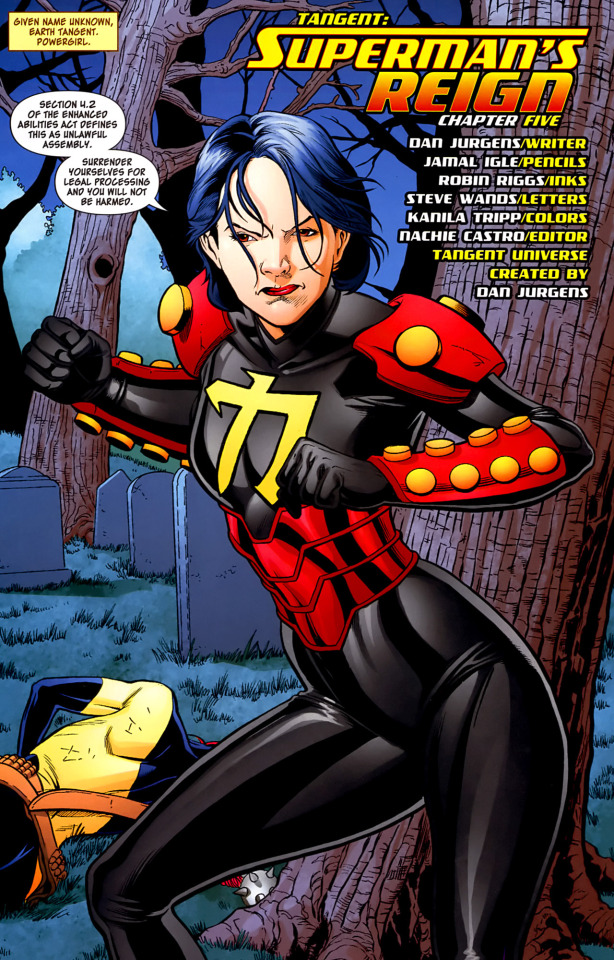
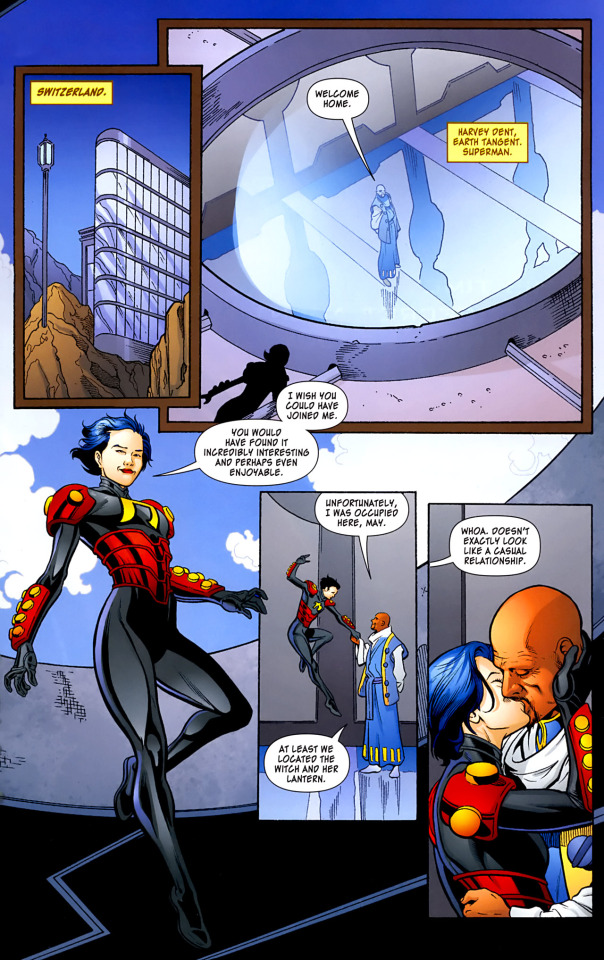
Power Girl, on the other hand, had become Harvey's new wife, the only one who could match both his near limitless powerset and detachment from humanity, they found in each other kindred spirits... and made everyone else's lives worse for it, even if they thought they were doing it for the greater good. Also, in my opinion, she got a much better costume. She was defeated alongside Harvey, and hasn't really been seen since.
The Teens & The Twenties- nothin'...
Not just Power Girl, none of these folks have really made an appearance in the ensuing years. Given the state of things in Green Lantern Dark, I wouldn't be surprised to see some of the Nightwing or Meridian folks pop up, but for now, we'll just have to wait and see...
#Metal Men#Tangent Comics#DC Comics#The Superman#Power Girl#Nightwing#Hawkman#Deadman#Black Lightning#Lobo#Gravedigger#Wildcat#Jade#Obsidian#Hex#Black Orchid#The Creeper#Superman's Reign#Green Lantern Dark#Nightshade#Night Force
5 notes
·
View notes
Text
Professor Francis Fukuyama is a prominent American scholar, political scientist who has written widely on development and international politics. He is probably most known for his work "The End of History and The Last Man," published in 1992. He joined our reporter, Philip Malzahn, in the studio to discuss democracy, the geopolitical landscape, and Russia’s invasion of Ukraine.
How do you think the Russian invasion of Ukraine has affected the global narrative around liberal democracy versus authoritarianism? And does it reinforce your earlier ideas about the resilience of liberal democracy?
I think that what has happened in the more than 30 years since I wrote "The End of History" and the end of the Cold War is that many people who lived in liberal democracies became rather complacent. They assumed that democracy would be the single framework for their societies and it wasn't really threatened by anybody. Especially with the beginning of the full-scale invasion, suddenly, people realized that democracy didn't necessarily always exist and that you had to fight for it.
Ukraine's fight for its own sovereignty and independence has been very inspiring to many people, but it also puts stress on democracy because the war consumes a lot of resources as well as lives. It's changed the global balance of power.
Europe had to wean itself off of Russian energy and that caused other geopolitical changes. The whole world politically realigned as a result of that. I think that has made us aware of, in a way, the fragility of the current situation that we're facing in terms of the stability of democracy.
So you basically say that the conflict that was thought to be a little bit lost has revived or has come back?
I think that in 1989 and then 1991, when the Soviet Union fell apart, for many people it was a relief because all these countries were released from the Soviet prison, in a certain sense. But we didn't anticipate some of the challenges that would appear, so many of the countries that had been communist and had rejected communism now started to show a certain nostalgia for the world that existed back then.
Then, it turns out that Russia was never really reconciled to the loss of its empire. I think that's what Vladimir Putin represents, is this intense longing for a past where they believe that they were powerful and glorious and they lost that somehow. And that has obviously been driving a lot of the instability in Europe.
Russia is the last colonial empire. Britain, France, all of these other countries used to have empires and they gave them up, because we live in an age of democracy where people are supposed to be self-determining. Russia is the only country that seems to think it deserves to maintain an empire.
The war in Ukraine has seemingly unified Europe in ways not seen in recent decades. Do you think this unity will persist in the long term? How much does it influence the future of the European Union and European democracy as a whole?
The unity was really remarkable in the first year of the war. I think that since then, as the war has dragged on, you're seeing cracks because in individual countries, there has been a little bit of weariness about supporting Ukraine. You're seeing the rise of populist parties like the AfD in Germany, where they're actually more on the Russian side than on the Ukrainian side. Overall, the situation is still reasonably good but there's growing opposition to support for Ukraine. That's going to be a real problem going forward.
How are traditional political blocs in their allegiance to Russia changing? For example, the AfD populist right-wing party which has pro-Russian sentiments.
Support for the Soviet Union was obviously a left-wing cause, but Putin has transformed Russia into a kind of fascist, right-wing nationalist state. Nationalists don't obviously work together at all times, but in recent years, they've been supporting each other in terms of opposition to Western liberal democracy. Liberal democracy means openness to the outside world, trade, and joining the European Union—this larger entity. A lot of individual nations resent that and want to assert their own national traditions.
Ukraine has expressed a strong desire to align with Western liberal democracies. How do you evaluate Ukraine's prospects for democratic consolidation in the context of the ongoing war?
There are two institutions that matter in this respect. One is the European Union, and the other is NATO. In terms of the European Union, I think that that's going to happen. There are accession criteria that Ukraine has to meet, but I think that's actually healthy for Ukraine.
It means that in terms of corruption, transparency, and a lot of governance characteristics—these are things that Ukraine has been struggling to do and should be doing in any event. I think those criterias will be met.
The NATO part is more difficult because NATO says that it won't accept countries that are actually in a war, which Ukraine is. On the other hand, you can't really end the war until there's a sufficient security guarantee for the future, so that the Russians can't simply start the war up again when they feel stronger. I think that’s one of the chief problems politically that we have to confront. I do think it's ultimately solvable but it is a conundrum right now.
How has the war in Ukraine altered the global geopolitical landscape, particularly in relation to the balance of power between liberal democracies and so-called authoritarian regimes like Russia?
There's a growing axis of authoritarian powers. It's not like the Cold War in that they don't all share the same ideology. For example, Iran is this extremist religious state, mixed in with China, which still claims to be a Marxist country. They all support each other.
What unites them is opposition to liberal democracy itself. They don't want to be any part of this Western mixture of free societies, open economies and the like. There's definitely an increasing degree of cooperation among these outsider countries or countries that have been outsiders.
As you said, countries are not necessarily all the same. Neither are the Western and liberal democracies, like Hungary and Germany. Sweden and Norway have huge differences in terms of political systems and society. But still, they treat us a little bit as a bloc, will we see a revival of blocs?
I do think that there is a natural affinity among countries that share basic democratic values, that they believe in a rule of law. They believe in checks and balances and constitutional government. Hungary, I think, actually doesn't belong in the European Union. They've adopted an authoritarian system. They're taking subsidies from the European Union, but they spit back this ridiculous nationalist ideology in the face of the EU.
The rest of the bloc is pretty unified in terms of its common values and a degree of mutual support, that's important. And actually, I think it's the authoritarians that are more diverse because you do have some coming from the old left, some coming from the right. What they have in common is really not any coherent set of values, It's more just dislike of liberal democracy.
In your book “Identity, The Demand for Dignity and the Politics of Resentment,” you discuss the importance of national identity. What implications does this have for Ukraine’s future?
National identity is important because if different people living in a society don't believe that there's an overall entity that they're loyal to, then they're going to behave in ways that are very destructive of the solidarity of that country. If they want to stick to one ethnicity or one region, that is going to weaken the country as a whole. There's also a challenge for a liberal democracy to have a national identity because, unlike, let's say, a fascist country, you can't emphasize race or ethnicity as the core of who you are.
That means that the task of a democracy is to build national identity around more abstract political ideas, and I think that's something that is true in Ukraine. Why do people not want to live in Russia? They don't want to live under an authoritarian regime that tells them what to do, what to think, controls their education, and prohibits them from moving around and doing things that they want. That is an important freedom that Ukrainians have. I think that can be the basis for a distinct Ukrainian identity.
Then there are also cultural things, I think Ukrainians are discovering now that their history is unique in many ways. It is not necessarily just part of this larger Russian historical narrative, the way the Russians believe it is. I think it's important to be able to hold onto those aspects of national identity.
What do you predict for Russia's political future in the aftermath of the war in Ukraine, maybe even during the war in Ukraine? Could internal pressures lead to significant changes?
Theoretically it could. The Russian Federation is very heterogeneous and the war has put certain strains on that. For example, the Russians don't want to recruit their own ethnic Russians as soldiers, because I think Putin fears that that's going to create a pushback from his own population. They're using a lot of ethnic minorities, Buryats, Chechens and so forth.
That works in the short run, it also is going to lay the groundwork for some ethnic tensions. Overall, I'm not expecting the Russian Federation to fall apart anytime soon because it does have a lot of resources to hold itself together.
Assuming a postwar scenario, what role do you envision for Ukraine in the broader international community? How would Ukraine's experience and resilience influence other countries facing similar threats to their sovereignty and democracy?
I think Ukraine has been a tremendous inspiration to democratic people all over the world. We usually don't face the serious threats that Ukraine has faced. I think the way Ukraine has met this challenge is a great inspiration – not just the soldiers fighting on the front line, dying and wanting to persevere, but also the degree of innovation and entrepreneurship. For example, creating a whole drone core industry. That's something that's quite remarkable that nobody else has done. I think those things are going to be copied by other countries.
Speaking about postwar scenarios and a little bit about the future, I would love to ask about the U.S. elections.
I think the American election is going to have a big impact on Ukraine. It's actually very easy to manipulate Trump. You just have to praise him and build up his ego. Putin has been very successful at doing that.
Vice President Vance just put out his own peace plan that's identical to Putin's, basically to have a ceasefire. Then Russia gets to keep whatever territory it's succeeded in occupying since 1991. I think that that's going to be terrible for Ukraine because it's going to mean a loss of territory, sovereignty and so forth. The Harris administration will not do that.
There's obviously been unhappiness with the Biden administration not giving permission to use the weapons that have been provided. As their range would really be necessary to defeat Russia. That's a fight, that's ongoing. I think, eventually they're going to give in on this, but that's a lot better than being cut off. It was the Republicans in Congress that cut off all weapons supplies last fall. I think that is what you can expect if the Republicans win the election.
How do you assess the response of Western democracies to the war in Ukraine? Has the West's strategy been effective in defending liberal democratic values, or has it revealed weaknesses?
I think the biggest critique I have of the Western response has really been the American one, because the United States is the main supplier of military equipment. I think that the United States has had an excessive fear of escalation on the part of Russia and as a result, has not provided sufficient weapons and given permission to use them in a fully effective way over the last two and a half years of the war.
I think that continues with these restrictions by which long range missiles can be used by Ukraine. At the present moment, I don't really see any way of deterring these Russian missile attacks unless they are also subject to a similar kind of strike threat. That's a direct result of calculations made in Washington that I think are excessively cautious.
UNITED24 Ambassador Francis Fukuyama is raising funds to help clear Ukrainian land from Russian explosive ordnance, as part of the platform’s Humanitarian Demining program.
3 notes
·
View notes
Text
Dracula and its adaptions: Queer reading Francis Ford Coppola’s version of Dracula?
In today’s session we talked, among other things, about queer readings that have been applied to Dracula. As I personally whole-heartedly agreed with those, I wondered whether or not adaptions of the text had taken its homoerotic undertones into account. Francis Ford Coppola’s 1992 adaption of the text seemed especially interesting to me, as it claims to be one of the most authentic adaptations, already bearing Stoker’s name in its title. And although many have deemed the film to be certainly closer to the text of the original as some of the other predecessors and successors, James Von Allmen Hart who acted as the screenwriter definitely took some rather large liberties. In contrast to the original novel, which consists of letters and other sources produced by the human protagonists, the film spends quite some time on the figure of the count, who is provided with a full backstory. After having defended his Christian country successfully against the Muslim Turks, he arrives in his castle, only to find out that his lover Elisabeta has killed herself in grief, having received a false report claiming his death. As the priests tell him that her soul is lost due to the sin, she committed by ending her own life, Dracula curses them, as well as the whole religion and wrecks the chapel, which subsequently starts to bleed. Drinking from this blood, he becomes a vampire and is condemned to mourn in eternity. When Jonathan arrives, he however stumbles across a photo of Mina, who seems to be the reincarnation of Elisabeta. He thus sets out to find her in London (though he wanted to go there beforehand already for reasons that are never really explained). The film is therefore not a pure film adaptation of the material, but rather an interpretation and further development of it.
At first glance, Coppola’s film seems to me evidently more heterosexual than Stoker’s text. Not only seems the count’s whole monologue on love now apply to Mina, the scene where Jonathan is being seduced by three vampires is even more sexually charged as in the original, as the three women lure him onto a bed where they meet him bare-breasted and adorned with oriental accessories. Furthermore, Lucy is not the somewhat innocent girl, asking jokingly if she could not maybe marry three people, but more of a vamp (even before she turns into the real thing), as she blatantly flirts with all of the three men, calling for example Morris a “wild stallion between her legs” (who would say that in real life?). She is furthermore not only being bitten by Dracula, but also has sex with him, while she is clad in red, spread on some sort of stone altar. And last but not least even the virtuous Mina is depicted as somewhat sexually frustrated, being left alone by Jonathan and looking at pictures of sex in the novel “Arabian Nights” and greeting Dracula whom she has come to know under his guise as a prince “Oh yes, my love you found me. I wanted this to happen. I know that now. I want to be with you always”, while she is visibly aroused by the nearing presence. She furthermore has a lot of sexual chemistry with Van Helsing (though one can argue that is also the case in the novel) and kisses Lucy during the rainstorm that is brought by Dracula, which the only event in the film which I would claim to have at least somewhat of the homoerotic subtext that is present throughout the book. Other than that, the film seems to rule such an interpretation out, therefore focusing more on the renouncement of Christianity and a seemingly resulting sexual debauchery and thus on the regulatory power of faith.
0 notes
Text
Warning from Trieste - Decision 2024
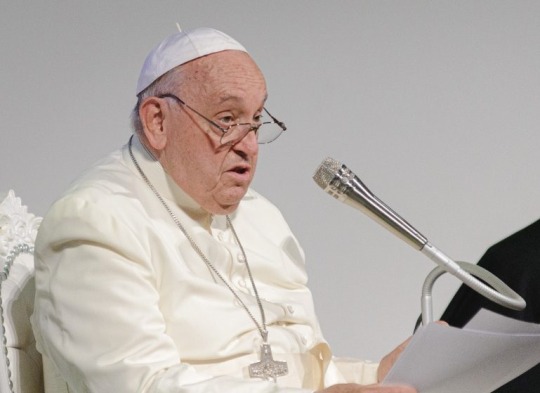
Is the free world in crisis? In many countries with at least some tradition of democracy, there has been a surge of hard right-wing candidates who seemed disinterested in such institutions, many of which won power: Vicktor Orban in Hungary, Andrzej Duda in Poland, Ferdinand Marcos Jr in the Philippines, Yoon Suk Yeol in South Korea, Narendra Modi in India, Javier Milei in Argentina, Nayib Bukele in El Salvador, Daniel Ortega in Nicaragua, and of course Donald Trump in the United States of America.
Within 10-15 years of a financial crisis there always seems to be a political crisis bound up in populist ideas of national identity and the injustice done to the national spirit by a threatening outsider group. Political scientists will tell you when there is profound insecurity in people’s livelihoods, particularly in basic necessities like food and housing prices, cost of living matters if you will, revolution and chaos are not too far behind.
That might all seem like old news for those of us in the U.S. We endured the COVID19 pandemic with one of the aforementioned leaders contradicting public health directives almost non-stop. But if you ask me something has changed more recently here in American politics. Yes, the right-wing trendline is the same here as it is worldwide but distrust in the institutions of democracy has grown more widespread across the spectrum of political opinion.
What was once just an eye-catching survey result years ago, widespread distrust in institutions including the government, has morphed into doubt about the very project of democratic governance, to the point that it is seemingly baked into American political culture at this point. Do we believe that our government system works anymore?
Since the Second Vatican Council in the early 1960s the Catholic Church has formally endorsed representative democracy, or at least governance that empowers peoples to have control of their own destiny. In the shadow of the madness of the Second World War the thousands of Bishops gathered at that Council felt some sense of moral responsibility. They had failed to prevent the totalitarianism that authored genocide and the deadliest conflict in human history.
Declarations that would have been thought unnecessary a century earlier, against antisemitism and totalitarianism, were more uniformly accepted than the theological documents about the stuff you think about when you call the Catholic Church to mind. In retrospect it’s quaint and charming imagining that many people agreeing on anything, particularly with the added layer of religious discourse.
On politics and peace, what emerged from the Council was clear. Whether it was Pope John XXIII writing against nuclear war in 1963 or his successor Pope Paul VI actively pushing for treaties on trips abroad, the peacemaking tune out of the highest levels of the Catholic Church has been unmistakable since Vatican II. More than that, in recent decades the criticisms of war and autocracy has gotten so acute that it may seem impossible for the world’s political leaders to obey if they wanted to.
Just-War theory has been so narrowed by recent Popes that you might wonder if any war is justified. The Death Penalty has been explicitly condemned by the Vatican. Neat idea, eh? Pope Francis goes even further to decry predatory housing practices, denial of healthcare, and ignorance of the elderly as gravely sinful behaviors on a societal level. That last one played no small part in my own decision to do my current work in the regulation of Nursing homes and other facilities designed for older adults which often become warehouses.
For the current Pope politics is not off limits but it’s also never partisan. It should come as no surprise then that Pope Francis struck a chord that will ring loudly in the ears of Americans on a trip earlier this summer in the northern Italian city of Trieste. In an election year such as ours I felt too moved to not write about it.
Pope Francis in Trieste
Pope Francis is not the miserly, scolding grandpa his critics would have you believe. He is generally attuned to the needs of a time and place before the people affected know what to ask of him. Within the first year of his papacy he said something that sticks with me to this day and cuts across all facets of the human experience: “If nobody is to blame, everyone is to blame.” Sit with that for a moment and get back to me.
That quote was part of a speech on the Italian island of Lampedusa where migrant boats and the bodies of those who didn’t survive the journey wash ashore regularly. For however bad you think the migrant crisis is here in North America its far more gruesome in Europe where a stormy sea is the main obstacle. Francis knows how to moralize without proselytizing, a rare balance from any minister, never mind the Pope.
On July 7th in Trieste, the Pope was speaking to Catholic Social Week, an annual gathering of civic minded activists discussing the state of Italy and the world since 1907. He delivered another classic speech that feels to me like a clear warning for every person blessed with the vote and political agency in their civic context. I encourage you to read the text of the brief speech with the link here below because he covers a lot with not many words.
Early on Pope Francis acknowledges that world democracy today is not in good health. This is couched in the Italian context but extended out to the whole free world. Specifically he says this after quoting the founder of the social week he was speaking at, Blessed Guiseppe Toniolo, who said democracy is “…that civil order in which all social, legal and economic forces, in the fullness of their hierarchical development, cooperate proportionally to the common good, flowing in the last result to the prevailing advantage of the lower classes.”
You can already tell Pope Francis has a higher standard for democracy than even great patriots here in America. Democracy is not just government by the people oriented toward freedom and liberty, for Francis, democracy is a governing system aimed at the common good and helping the less advantaged. You can see how this would clarify one’s perspective on socio-economic disparities, healthcare, the environment, and many other issues that unnecessarily create suffering for those living under democracy.
Personally I think it goes a long way to clarifying some erroneous practices we take for granted here in the US that ultimately make us less free, perhaps leading us toward a more dictatorial system, but I am saving my editorializing for later.
Where the Pope’s speech goes next is very touching: he uses this image of a wounded heart as a metaphor for what he calls a crisis of democracy today. Marginalization of various people groups hurts the whole social body and makes the whole system less effective and more self-referential. This is like any number of ailments that make the literal human heart work harder and eventually lead to heart failure.
That term, self-referential, is a term Francis uses often. In religious contexts he uses it to refer to all manners of religious people who think so highly of themselves and the religious identity they inhabit that they turn inwards in corrosive selfishness. One example is clergy and laypeople obsessed with the latin mass and fighting him to the detriment of Church unity. Their vanity then has a certain parallel in the secular world when we become so absorbed in our chosen socio-political identities that we become worse for them.
If you consider yourself an avid follower of news and politics then I imagine you know what we’re talking about here. In particularly difficult electoral cycles I have seen friends and politicos I follow spiral into mental health crises over a political agenda. This is not to diminish important political priorities, only to point out how they might be costing us too much of ourselves.
After this metaphor, the pontiff goes onto quote a former Italian prime minister, Aldo Moro, emphasizing, in essence, that democracy is not democracy unless it is at the service of our humanity: that is, human dignity, freedom, and autonomy. Moreover, even if one has the right to vote, are the conditions being created in their body politic to vote knowledgably and wisely, allowing evermore people to vote?
That message hits pretty hard on its own but then Pope Francis speaks of “…freeing ourselves from the waste of ideology…” He is criticizing the lionization of ideologies themselves in political thought. He means that familiar drive to align yourself with a certain, longstanding party or political philosophy to the automatic forsaking of countervailing viewpoints. In short, he is saying that sticking to these too closely will affect us negatively on a human level. Beyond politics you will find the pontiff criticizing ideological rigidity but when he turns it on politics it feels very relevant here in such a starkly divided America.
Circling back to the Aldo Moro bit for a moment, we might ask ourselves how our political viewpoints impact human dignity. If we believe some people shouldn’t vote, what does that say about how we view their humanity? Even further, if we believe others would vote like we do if they were simply smart enough to understand our viewpoint, are we not subtly telling ourselves we are better than?
It only gets sharper when the Holy Father says: “Ideologies are seductive... but they lead you to drown yourself.” Remind yourself these are the words of one of the most well-regarded religious figures in the world today. This warning highlights the earlier quotation pushing the idea that democracy needs to serve our humanity. If we participants in democracy degenerate our humanity through excessive participation in ideology, do we not then degenerate the democracy we live under?
Entering the back half of the speech, his holiness goes onto remind listeners of solidarity and subsidiarity. These are the two bedrock principles of Catholic Social teaching. In this context they refer to the importance of people acting with regard for each other’s plight (solidarity) and the maintenance of political systems that allow everyone to have a say in the policymaking closest and most relevant to their time and place in life (subsidiarity). A disappearing generation of hippie Catholics here stateside could rattle these off for you like second nature.
These principles are invoked to remind us that valuing every person is critical for democracy to persist. Healthy democracy, moreover, requires a practiced ability to transition “…from cheering to dialogue” as the Holy Father puts it. This is to say democracy falls apart when campaigning is eternal, and governing is the afterthought. One specific former American President comes to my mind at that, but I am trying to hold off my analysis at this point in the article. It is tough.
We are roused by campaigning, excited by the thrill of feeling seen and represented, but we are challenged by the task of governing. We are being called to allow ourselves to be challenged instead of fixating on the thrill of increasingly tribal political connections. Good governance is almost always a balancing of different views and possibilities for the maximum possible benefit of constituents.
You don’t have to read too deeply between the lines here to see how Pope Francis is saying that a exceptional love for ideologies in democracies leads to erosion of democracy and the undermining of the dignity of individuals and our humanity as a whole.
Something in that transcends politics into a cultural moment we Americans are in that feels quite sick. Too many of us are so culturally fortified that we begin to see democracy itself as a mere threat to our echo-chambers. Some of us view democracy itself as undermining the common good. This is a fringe trend that has seen some mainstream adoption in the last 8-9 years here in the US. Perhaps it subsides with this election cycle? Let’s get back to the Pope’s warning from Trieste.
The dialogue Pope Francis is advocating for here is in service of inclusion. Once again, democracy is healthy in so far that it is in the service of as many of its constituent people as possible. Those who feel left out are liable to be taken by hopelessness which feeds so many of the flaws that can arise in democracies like militarism, welfarism, hypocrisy, and indeed the tribalism that seems to have generated the crisis of democracy we’re talking about here.
This is where the connection to that 2013 speech in Lampedusa returns to my mind: “If nobody is to blame, everyone is to blame.” In that same speech, the newly elected Pope also spoke about the “globalization of indifference”. We can think of this as his way of talking about the current phase of the information age when we have so much news, facts, and opinion at our fingertips and yet seem more disconnected from each other than ever before. Mind you, he was saying that in 2013.
How have we become so disconnected? How do our disconnections, even within our own political contexts, within our own communities, affect our culture of democracy?
Who is being left out of democracy? Everyone registered above the age of 18 can vote, yes, but who is being left out of the fruits of our system? Those who we leave out intentionally are signs of a deep political illness within us. Those who we leave out unintentionally are the next frontier of inclusion and representation. This is, in some way, a good checkup we can always do on the health of our democracy.
The home stretch of Pope Francis’ Trieste speech turns the wounded heart into the healed heart. He gives hopeful examples of creative efforts to set aside indifference and include as many people as possible in the project of democracy. Examples he uses include recent Italian legislation giving those with disabilities more access to financial services as well as technological innovations designed to assist the protection of the natural environment.
The Holy Father says bluntly at this point: “The heart of politics is participation.” This fraternity requires courage to think of ourselves beyond ever narrower “clan groups” and as broader, more diverse and inclusive people groups. How he is using that word, people, is somewhat lost in translation. A people group is not the sum of individuals but the collective sharing in a dream, a vision for a distinct time and place and those who inhabit it. That is to say, the political entity of a nation-state may or may not be representing all the peoples within it or forging peace within and outside their borders.
The pontiff contrasts this against populism, the political calling card of this crisis of democracy we have found ourselves in. That populism, and the many darker things it can bring (as Europeans are better at calling to mind for obvious historical reasons) prefers easy solutions that ultimately work against ever greater inclusion in favor of increasingly self-referential policy goals: the slow, formal erosion of democracy. Moreover, populism requires an ever-narrower definition of the people group resulting in more exclusion. Us versus them thinking, the bane of existence for diverse democracies, is essential in how populism works in most places.
Underrated point within these closing sentences for me is when the Pope says “Democracy is not an empty box…” He says to speak up with a faith that is not private but is also not interested in defending privileges. The primarily Catholic audience for this speech understood the Pope was taking a swipe at Italian populism specifically here. Populism pits the majority group of a place in defense of perceived lost privileges. In Italy the majority is Catholic. The message is global though: we religious people must not be private about our faith while also being humble enough to not participate in the political process exclusively for the gain of our own distinct in-group.
Moreover, Francis states political love requires us to address causes more than effects, choosing responsibilities over polarizations. We are to make value judgments on responsibilities, not the party line decided by our chosen political tribe. When you’re politically active in defense of a set of societal privileges you like then you are liable to often find yourself on the wrong side of history in a diverse democracy.
A closing word on politicians themselves sneaks up on you at this point. Good politicians have civil passion according to Pope Francis, leading from among the people, perhaps back with the stragglers, to use a shepherding metaphor.
Lastly, the Holy Father speaks to efforts to “organize hope” as the basic command of Catholics, and really all people, who believe in democracy. In a comparable sentiment to the Martin Luther King Jr wisdom we are familiar with here in the US, “The arc of the moral universe is long, but it bends toward justice”, Francis says time is superior to space. That is to say that the raw pursuit of positions of power can miss the crucial, more powerful work of doing what it takes over time to do what is right in the end.
Hope, we find at the end of the Pope’s speech in Trieste, is required to build the future. Without hope we are mere administrators of the present, disconnected from building any kind of worthy future for democracy or the dignity, freedom, and autonomy that a more perfect fraternity forms in healthy democracies. All of these high ideals for democracy are just more preaching from the Pope unless we possess the boldness to hope for them and then organize that hope into a movement.
The United States in peril – the World in peril
There is so much here to note and take to heart. I really don’t know where to start. Just contemplating when this speech was given will make your head spin. July 7th was the Sunday after transformative elections in Britian which ended fourteen years of the rule of the right-wing party there. That same day the second round of French parliamentary elections saw a stunning reversal of fortunes against the far-right National Rally party which gave birth to a hung parliament that will force French MPs to work together or face another election in the very near future.
For us in the context of the United States of America, July was a decade unto itself in our politics. Recounting it now feels like the first draft of a history lesson.
After President Joe Biden struggled through a debate with former President Donald Trump in June, there was a relative panic attack among the Democratic Party, horrified the aged Biden could not beat the insurrectionist returned to finish the job. The calls to step aside eventually dislodged the presumptive nominee for his younger Vice President. To inhabit that moment you have to contemplate the stakes involved.
The fear about how best to defeat the creeping authoritarian who is now advocating for concentration camps for migrants and pardons for insurrectionists was palpable throughout the month. Yes, this is where I begin editorializing. The upshot on the November Presidential election was not good before President Biden dropped out; at least for those of us who see some existential risk in re-electing a former President who felt the institution of democracy itself was an obstacle to him at least on one January day in 2021.
On July 9th one Volodimir Zelensky, President of embattled Ukraine, spoke at a summit of the leaders of the North Atlantic Treaty Organization (NATO). He said what everyone understands bluntly: the world’s eyes look to November. If my perspective about what a second Trump term in the White House would do to America seems verbose then consider the message when it comes out of the mouth of President Zelensky.
Donald Trump has stated he will not defend NATO from Russia if reelected. Where does that leave Ukraine actively trying to fight off Russian invasion? President Zelensky has signaled he would go down with his country if it came to it. With U.S. aid being the logistical make or break for his nation’s war effort Zelensky really is saying that our election will decide whether he lives or dies. Something about solidarity from the Pope’s speech in Trieste might be coming to mind again for you here.
On July 13th, a mere six days after Pope Francis’ speech in Trieste, a gunman with no apparent motive as of the writing of this blog, tried to assassinate former President Donald Trump outside of Pittsburgh, Pennsylvania. Political violence undermines democracy in few acts more vivid than a political assassination. We may never know the shooter’s motive, he was killed at the scene, but he was only 20 years old and suffice to say he grew up in this current national climate of political hatred. What impact had this period had on him? I know we will never know but as someone who also grew up in it I struggle to think there was no impact.
We were centimeters away from entering what would have definitively been the darkest timeline. But our politics here in America are so sick now, no matter who you blame it on, that what would have otherwise been the central topic of American political life for months if not a year plus, an assassination attempt on a former President and current presidential candidate, was set aside within weeks. Call that the election year news cycle or, as I prefer, think of it as a deep illness of American political life.
Before the month was out the new presumptive Democratic Party nominee solidified intra-party support and began a more rigorous campaign schedule than her President. That presumptive nominee, Vice President Kamala Harris, will be accepting her party nomination formally in Chicago later this month. With that, the final form of the 2024 Presidential election will take shape. With Pope Francis’ warning from Trieste in mind I wonder if we should ask ourselves some tough questions.
A warning for America?
Institutional distrust, that is distrust in the very organization of American democracy, is at such an apocalyptic fever pitch with even your average American that it threatens the project of this country itself. Authentic hope is out of the picture. Self-giving love is practically gone from the world of American politics.
That seems trivial unfortunately for we political junkies embroiled in this stuff on a daily basis, but draw your mind back to human dignity as Pope Francis did in Trieste: What does our terminal institutional distrust do to the system’s ability to do good for people, their dignity, autonomy and the common good?
In President Biden’s speech exiting the race for re-election he posited the idea that character in public life should still matter. That is to say: America must still pick her leaders based on an appreciation for their objective goodness and humanity. What a hopeful idea. We all seem to have the sins of our leaders on our fingertips as if a dagger ready to defend ourselves from their supporters. That isn’t organizing hope, is it? Quite the opposite I would say.
Are we too cynical as a people to define our politics by hope and character? If healthy democracy is to serve our common humanity then it would require great character and at least a general rejection of cynicism, no? Maybe I’m naïve. The alternative these days seems to be deciding that human frailty makes no person truly moral so nobody can be trusted with power. I know I am speaking in sweeping moral generalizations here but look at where we are as a country politically. Measured rhetoric doesn’t seem to catch on these days.
The initial reactions I saw to Biden highlighting character in public life was scoffing and patronizing doubt. To be clear, those were reactions I saw from people who generally supported the now lame duck President and his party. That was disheartening. In the same speech abdicating the 2024 campaign Biden reached to the epicenter of so much of contemporary American political cynicism...
“America is an idea – an idea is stronger than any army, bigger than any ocean, more powerful than any dictator… We’ve never fully lived up to this sacred idea [of the USA], but we’ve never walked away from it either. And I do not believe the American people will walk away from it now.”
Forgive me for being proud of one of my co-religionists, but President Biden ending his political career this way sings more eloquently to the Catholic political experience in America than anything I have ever seen or learned about previously. I wrote another article entitled JD Vance Catholicism on this same blog site and you should read if you want a synopsis of that history. In the meantime, consider Biden’s biography as he says this.
A man who fueled himself with the doubt of his detractors all the way to the White House, stepped aside when he realized it was necessary. A man who attends Mass more regularly than most everyday Catholics I know, chose humility in the face of what he and his political allies say is a moment of existential political danger for the country. I know in my heart that man prayed about this. He has suffered a great deal in his own life and was not about to allow more suffering fall upon his countrymen just because of the pride one feels possessing the most powerful job on earth.
President Biden knows the Holy Father’s warning from Trieste even if he did not hear it before his dropout speech. If our democracy is sick, we need to heal it now before the ailment gets worse. You can tell that even Biden knows there is a sickness to be healed in his speech, even speaking of dictatorship like it’s a possibility here in the USA.
There is also hope in Biden’s farewell; hope we as a people can sustain a healthy democracy that centers and elevates the best of our humanity, not the worst of it. I certainly don’t agree with everything Biden believes politically but the hope he speaks to in this moment is nothing short of essential. We need to be a nation of solidarity for all this country’s peoples and create policy with humanity in mind more than any individual or group of people’s privileges. Humanity comes before anyone’s privileges.
Now Biden’s Vice President Kamala Harris, whom he endorsed to take up this mantle of American democracy, is campaigning against an opposition candidate who has already shown his willingness to subvert the basics of that democracy to try to remain in power. Please, recall January 6th seriously for a moment, and contemplate what that view of America in a President would mean in the context of the Pope’s warning from Trieste.
Go vote on Tuesday, November 5th if you are registered and so able. Vote absentee or however best works for you. But take it seriously, not just because your political tribe has put absurdly high stakes on the outcome. Take it seriously because in the free world we are given this incredible civic sacrament to participate in making the world a better place.
Hold out hope that such a better world is possible. Fortify yourself in hope, not ideology. Democracy is healed when we “organize hope” in the words of Pope Francis; when we choose to work on causes more than effects, choose responsibilities over polarizations, and solidarity over ideology. Those are choices we must make long after election day no matter what the result is.
We are too big and diverse a country to give up on democracy. We are too big and diverse a country to treat hope like a fanciful ideal. Cynicism doesn’t save you. That’s what hope does. What I see in the Pope’s warning in Trieste is a blueprint to not just save democracy but heal it of the illness of cynicism which got us here in the first place. That is a warning to both sides of the aisle, and every free person preparing to vote. Heed the warning from Trieste.
1 note
·
View note
Text
"The loudest applause was for Stan for his transformative performance as Trump."
The Hollywood Reporter
Donald Trump Movie ‘The Apprentice’ Shocks Cannes, Receives Nearly Eight-Minute Standing Ovation (click for article)
"There is no nice metaphorical way to deal with the rising wave of fascism," director Ali Abbasi said when asked why he wanted to make the film about the former president's rise to power in 1980s America. "I think it's time to make movies relevant. It's time to make movies political again."
Patrick Brzeski and Scott Roxborough
MAY 20, 2024 11:53AM PDT
One of the most anticipated moments of the 77th Cannes Film Festival finally arrived Monday night with the world premiere of the Donald Trump drama The Apprentice, starring Sebastian Stan as a young version of the real estate mogul in his pre-MAGA days.
Only Francis Ford Coppola’s wildly ambitious swan song Megalopolis had inspired more pre-premiere chatter and curiosity at this year’s edition of the glamorous French film festival. Ahead of its unveiling, virtually no one had seen The Apprentice, as the movie reportedly was finished only days before its premiere.
Directed by acclaimed Iranian-Danish filmmaker Abbasi and written by Gabe Sherman, The Apprentice explores Donald Trump’s rise to power in 1980s America under the influence of the firebrand rightwing attorney Roy Cohn. Succession star Strong co-stars as Cohn, along with Martin Donovan (Tenet) as Fred Trump Sr. and Oscar and Golden Globe nominee Maria Bakalova (Borat Subsequent Moviefilm) as Ivana Trump.
Several shocking moments late in the film — a scene depicting Trump’s alleged rape of his first wife Ivana and a surgery room sequence showing Trump getting liposuction — drew audible gasps from the Cannes premiere crowd. As the final credits rolled, the Cannes crowd starting clapping in time to the sound of Baccara’s “Yes Sir, I Can Boogie” playing on the soundtrack.
After the screening, Abbasi warmly hugged his cast members and Cate Blanchett, sitting just in front of the director and crew, was the first to jump up and applaud, embracing Bakalova. The loudest applause was for Stan for his transformative performance as Trump. The crowd enthusiastically cheered and clapped, staying on their feet for nearly eight minutes, though many were spotted ducking out of the theater by the four-minute mark. Abbasi kept the crowd going, applauding and pointing randomly to people in the audience. Abbasi also held up his cell phone to the cameras during the standing ovation to show a shirtless selfie of Strong in costume and seemingly backstage from his play in New York. The moment drew big cheers and Abbasi kissed the screen of his phone.
When addressing the crowd, Abbasi commented on the current world events such as the war in Ukraine and the ongoing Israel-Hamas war, explaining how “in the time of turmoil there’s this tendency to look inwards” and “to bury your head deep in the sand and look inside and hope for the best.”
“The storm is not going to get away. The storm is coming. Actually, the worst times are to come,” he added. “But you can pretend it’s not here. You can also deal with it.”
Abbasi then addressed being questioned why he wanted to make a movie centered on Trump and argued that films need to be “relevant” again. He explained, “There is no nice metaphorical way to deal with the rising wave of fascism. There’s only the messy way. There’s only the the banal way. There’s only the way of dealing with this wave on its own terms, at its own level and it’s not going to be pretty, but I think the problem with the world is that the good people have been quiet for too long. So, I think it’s time to make movies relevant. It’s time to make movies political again.”
By Monday night, The Apprentice still didn’t have a U.S. distributor in place, although it sold earlier in the Cannes festival to StudioCanal for the U.K. and Ireland, where it will be released theatrically later this year.
Rocket Science is handling international sales on the project, which was financed by Kinematics, Head Gear Films, Screen Ireland, Film i Vast, the Danish Film Institute and National Bank of Canada.
The movie is produced by Daniel Bekerman for Scythia Films, Jacob Jarek for Profile Pictures, Ruth Treacy and Julianne Forde for Tailored Films and Abbasi and Louis Tisné for Film Institute. Executive producers are Amy Baer, Mark H. Rapaport, Emanuel Nunez, Josh Marks, Grant S. Johnson, Phil Hunt and Compton Ross, Thorsten Schumacher, Niamh Fagan, Sherman, Lee Broda, James Shani, Andrew Frank and Greg Denny.
#the apprentice#the apprentice review#the apprentice movie#sebastian stan#donald trump#jeremy strong#roy cohn#maria bakalova#ivana trump#ali abbasi
1 note
·
View note
Text
I will say that while I agree with the second point (Selenia got done so dirty the moment she and Arthur became a thing, and that happened out of actual thin air, no chemistry to add to all of that) the first purported issue is honestly not accurate?
I'll refer to the tribe as BM, cuz of brevity sake.
The BM aren't the only ones who get the pass up, the world of the Minimoys is largely unexplored and left way too vague, and this is despite that fact that the 3 movies largely take place in their world. Anyone that's not a main character gets the side character treatment, even Archibald, who would have the most to say and a lot of intrigue to add considering he kickstarted all this off.
For the implications of Archibald being racist or that he is from the 1960's therefore he may have, idk, forced the BM to move from their original homeland, considering when Archibald comes back to the human world and they are all ecstatic to see him, and in the second movie it's revealed that Archibald went through the same three trials that Arthur went through at the beginning of the movie, and he shows Arthur his own medallion with pride, idk how you can claim that the relationship between them is one-sided or nefarious, there really isn't anything to suggest that, in fact, the opposite is kinda proven.
For Rosie or Francis/Armande, they were out in the hot sun all day digging for the rubies and out of nowhere 5 giant men holding weapons appear from seemingly nowhere, I understand that with all the heat and stress of your son going missing, as well as potentially losing that house, that yeah, seeing 5-6 giant men holding weapons would freak me out or cause me to faint out of shock and terror.
In terms of how Armande describes them, their most predominant feature is that they are tall, and that their skin tone is black.
Unless there's developer commentary or after-statements made after the movie came out about that scene, I don't think there's really enough there to claim it was subtle racism.
To show how imposing they are, Davido, the land developer who was after the rubies, ends up taking a policemans gun and steals the rubies, only for him to walk back-first into the BM, who are still holding their weapons, though Davido is holding an actual revolver, much more powerful than all of the BM and their own weapons, he is so shocked from their imposing stature that it is easy to subdue him.
Also, at the end of the movie, they are all having a dinner together, I wouldn't imagine two people that hate or are scared of black people would do that, it strikes me as a bit odd, to say the least.
That's why I think it was just a miscommunication due to them being so imposing, not saying a single word and holding weapons, just about anyone would he scared, no matter the skin color of the people holding the weapons.
In terms of the face paint, I don't really see the issue, I guess I'll need that spelled out for me, face paint is common among many cultures, and given that this was a sort of rite of passage, face paint makes sense, as it was a common thing among tribes to use face paint to denote someone passing that rite of passage, unless there's some kind of hidden meaning in how the paint was used, nothing is wrong with them painting Arthur's face, in fact, the BMs whole set-up in this scene gives their tribe as a whole more character, it shows that they truly are dedicated to nature, as was alluded to when Daisy read that book to Arthur in the first movie. This isn't me saying that they weren't still done dirty, but it's a huge step up given how absent they were in the first movie.
Also, uh, query how that whole section was culturally inaccurate given that the BM are a made up group of people with a made up culture, yes it may be derived from actual African cultures, however, the bulk of the BMs culture is woven around the Minimoys, being their opposites, and how it caused them to be so peace-like toward nature.
I think that a lot of the issues regarding the movies stem from the fact that not enough time was given for the world to properly develop, it was all so rushed. Think of a random established plot point in any of the movies and I guarantee you that you'll find that it is somehow contradicted by another plot point in the trilogy
Ultimately, I'd argue that despite it's tasteless portrayal of Selenia, and any other problematic aspects it may have, I don't think people should steer clear of what may be a childhood movie, I think that if you're able to critically analyze the movie and recognize what is wrong and what is not, that the movie is quite alright for a nostalgic watch.
I actually saw this post shortly before I saw the movies again, so I went in wondering if this movie was secretly racist and sexist, and that I just somehow missed all of that when I watched the movie as a kid.
And while, yeah, it definitely leaned into sexist tropes, and it certainly is questionable regarding the main romance between Arthur and Selenia, and on a whole, how Selenia was treated by the movie.
I don't really view it as having racist undertones, and with a clear view of it all now, I don't see any kind of stereotypes imbeded in the BM, of course, I could be wrong, maybe there was something neither the OP nor I brought up, but as for what has been brought up, I personally disagree.
Apologies for sperging out on this post, I'm pretty sure this movie trilogy is a certified special interest of mine lmfao. I plan to actually make my own post about this movie, since I've got so many thoughts about it, lol.
Arthur and the Minimoys or the nostalgic movie I would not recommend
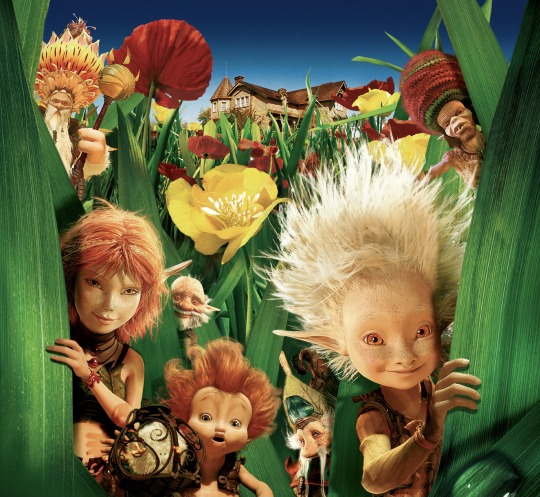
Back when I was little I was a big fan of a cartoon that told a story of a 10 year old boy traveling to the land of microscopic creatures in order to rescue his grandpa.But upon rewatching the trilogy (yes,there are three movies out there) I realized that it has way more problematic aspects then I remember.You may ask:what is so icky about a French cartoon from 2000s with uncanny valley effects that made you want to warn people?Well worry not,for I will explain it to you!
1.Bogo Matassalai
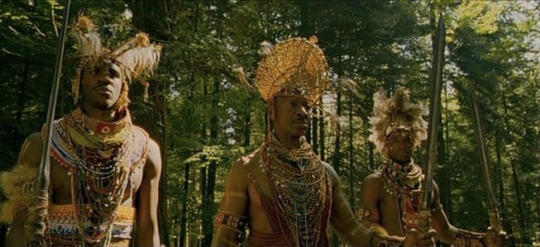
Bogo Matassalai is a fictional African tribe that the main characters grandfather,Archibald Suchshot,helped build an irrigation system.As thanks,they gifted him a bag of rubies and introduced him to their friends-minimoys.What is interesting though,is that both tribes mentioned moved to Connecticut,specifically to the Archibalds yard or nearby,seemingly without any reason (as it wasn’t mentioned in any film).Bear in mind that Arthur’s grandfather is supposed to be an explorer during the 60s,so now the implications are weird.
Another thing is Bogo Matassalais lack of individuality:we don’t learn about their reasoning behind abandoning their homeland to move with Suchshot,their backstories aside from what others told of them,even their names are unknown.The tribe usually shows up when the plot requires them to,helping the main character and then disappearing.What’s worse is the reaction of others towards them:Arthur’s father,Francis,after first seeing members of Bogo Matassalai,ran away frightened towards home where he tried to call the police,and when he failed,Francis tried to explain that he saw “tall and black” figures.His wife,Rosie,isn’t better in this regard:every time she sees the tribe,she either faints or acts as if they could bite her head off.It seems that the crew behind those films wanted to show the bias of Arthur’s parents and ridicule them, but without devoting enough time to this aspect, the audience only sees the shuddering and gawking at people of another ethnicity for the comedic aspect.
It’s also important to add that in the second film,the tribe wanted Arthur to pass the tests of nature,where he hugs trees and sleeps near wild animals.Aside from cultural inaccuracy I’m not qualified to dissect,we also get-
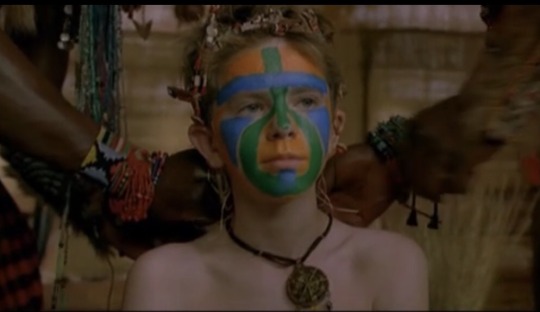
-this.
It becomes pretty clear that Bogo Matassalai are used either as a narrative foil or some kind of exotic “other”,stripping them of any personality or agency.However,this wasn’t the only instance the trilogy did certain characters dirty.
2.Selenia
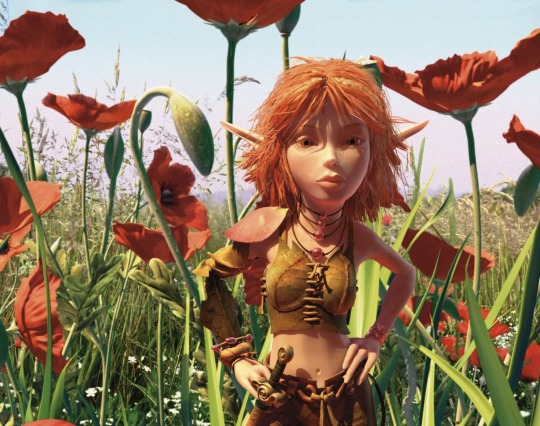
Oh boy,where do I even begin?The princess of the First Land was hinted to be Arthur’s love interest from the very start,but upon getting to know her we notice that she’s voiced by a grown actress(Madonna in the eng dub and Myléne Farmer in the french) and is sexualized either through frames that showcase her butt/breasts(like that scene when Arthur took a lace from her top-corset thingy and she had to hold it from falling apart) or through the words of grown men who want to marry her.So aside from objectification of said character,we also get the memo that she’s an adult and Arthur is too young for her.But apparently that isn’t the issue?During their stay with Koolamassai,the princess explains that she’s 1000 years old,but the human equivalent is 10.So now it’s confirmed that Arthur,a 10 year old boy,is considered an adult in Minimoys society and therefore allowed to marry Selenia,a woman who turns out to be a child in human years.So here we have a female character, who,despite being portrayed by the male gaze,is still implied to be a kid.
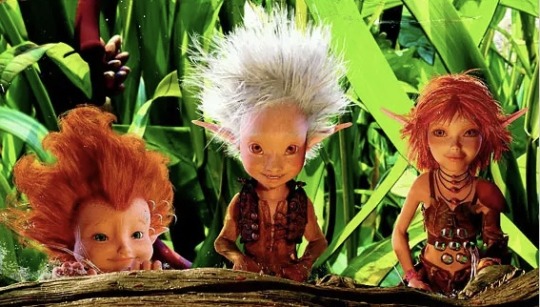
Thus here are my reasons as to why watching Arthur and the Minimoys may be uncomfortable for an audience who hopped on nostalgia train or wanted to see something new.
54 notes
·
View notes
Text
Some notes on Frank Underwood I don’t think people notice.
He grew up in a background littered with domestic abuse. He was born when his parents were presumably quite young (his father was 24 when he was born), he lived in an unstable background where food wasn't even a guarantee, his mother hated his father, hell his father even asked Frank to pull the trigger on his gun and kill him. And Frank regrets not doing it because the next seven years were full of abuse.
His faith in God was already shattered by the time he was at the Sentinel. He is not an atheist. He just believes God is cruel and hypocritical. He doesn’t even believe in heaven because of it. It comes from the place of someone who has most likely been shown the hypocrisy of something he has grown up with since childhood in his teenage years, and of course Frank never changes this view.
He didn't escape poverty even at the Sentinel. He spent his scholarship money on his father's gravestone because the Underwoods were that poor. And even then he had to work with a weed farmer to have enough money simply to buy school books.
He views himself as seemingly largely unlovable by default, especially given the breakdowns of his friendships such as with Freddy in the late seasons. He says as much to Claire when he says no one will ever love him like she does.
He is raped, but this is never acknowledged by the show as potentially having consequences for his mental health because he is a male victim (I will rant about how the 3x02 sex scene was rape for ages).
His anger causes him to throw things, and he easily gets violent. Yet at the end of it all he has a very machine-like atmosphere, he has to be stoic, at least in public, or he will just see everything crash down. Showing vulnerability is a weakness.
"But do you wanna know what takes real courage? Keeping your mouth shut, no matter what you might be feeling."
The voice he speaks with is just as much a persona as the rest of him. The persona is that he is affable, a Southern gentleman, he speaks eloquently if he can. He only speaks with his natural accent and dialect in one aside when talking about his childhood and an event that is parallel to his abuse. He is proud of coming from impoverished roots and making something of himself - but his natural voice reflects the trauma. He suppresses it.
Everything he does is based on one root cause - survival, not just legacy. He has fought to kept himself alive throughout his life. He has fought through being born into poverty. He has fought through both military college and Harvard. He has fought to be a congressman - in particular a Democrat in the Deep South - and later VP and president. His need for power comes completely from his will to survive.
"You don't deserve it. You have no idea what it means to have nothing. You don't value what we have achieved. I have had to fight for everything my entire life."
"We're murderers, Francis." "No we're not. We're survivors."
In conclusion your honour this man has C-PTSD but would never admit it
#house of cards#frank underwood#.. no reason why I’m making this I just think people don’t realise how truly fucked he is and how the writing just excluded him#yes Frank is a monster but he’s also remarkably humane in his approach and his understanding of people#his worldview is that he needs power to make up for the fact he never felt like he had control over his life#he’s an extremely complex character and there were so many missed opportunities to use that or explore his past#but I think it also explains his relationship with Claire to a degree#Harvard was apparently the first time in his life he ever felt in control of himself#and that’s also where he met her#she’s a lifeline for him. and he hates that because she’s so much richer than him she’s so much more free#he really feels he’s too worthless to be her equal. but he wants to be her equal regardless because he loves her.#that is what the Frank/Claire dynamic should have been#analysis tag
4 notes
·
View notes
Text
“We all have the temptation often to put ourselves at the centre, to believe that we are the axis of the universe, to believe that we alone build our lives or to think that our life can only be happy if built on possessions, money, or power. But we all know that it is not so. Certainly, possessions, money and power can give a momentary thrill, the illusion of being happy, but they end up possessing us and making us always want to have more, never satisfied. And we end up “full”, but not nourished, and it is very sad to see young people “full”, but weak. Young people must be strong, nourished by the faith and not filled with other things! “Put on Christ” in your life, place your trust in him and you will never be disappointed! You see how faith accomplishes a revolution in us, one which we can call Copernican; it removes us from the centre and puts God at the centre; faith immerses us in his love and gives us security, strength, and hope. Seemingly, nothing has changed; yet, in the depths of our being, everything is different. With God, peace, consolation, gentleness, courage, serenity and joy, which are all fruits of the Holy Spirit (cf. Gal 5:22), find a home in our heart; then our very being is transformed; our way of thinking and acting is made new, it becomes Jesus’ own, God’s own, way of thinking and acting. Dear friends, faith is revolutionary and today I ask you: are you open to entering into this revolutionary wave of faith? Only by entering into this wave will your young lives make sense and so be fruitful!”
- Pope Francis, APOSTOLIC JOURNEY TO RIO DE JANEIRO ON THE OCCASION OF THE XXVIII WORLD YOUTH DAY - WELCOMING CEREMONY FOR THE YOUNG PEOPLE, 25 July 2013
3 notes
·
View notes
Text
some ‘essay’ on how ghosts portrays death and my predictions on how each ghost may have died
i did mention parts of this in a little rant i did a few weeks ago but i thought id put my thoughts and observations into a more cohesive form and seeing as in-depth english gcse level essays are becoming popular in the ghosts tag i thought i might as well join in
‘essay’ starts below the cut
i think that i might’ve mentioned before that ghosts does a very good job of making light of death, while also keeping the sadness and seriousness of it. the best example for this is probably pat’s death. pat’s entire concept as a basic form is comedic in itself: he is a scoutmaster who was accidentally shot dead by an 8 year old with an arrow. when we see his death play out in the show most peoples immediate reaction is to laugh. his death was humorous. the way he gets shot in the middle of talking about how dangerous archery can be, the way the kid who did it (keith) tried to cover it up by passing the bow to another scout, pat’s mumbling about getting one of the kids to drive him home as he fumbles to find his keys - these are all comedic elements of his death. it’s supposed to be funny. however, at the same time, his death is still sad, especially when you consider the fact that he died in front of a group of children. this is made even sadder when we see how much pat’s death affected keith even into his adulthood. while pat frantically searching for his keys with his massive keychains is funny, there was also the sad element to it which was the panic he was experiencing. he knew he was going to die, but he still had a little bit of hope that he could manage to get home and see carol one last time. there’s a perfect mix of both the light and dark of death. it’s funny because its a comedy show, but its also sad because its death, which is one of the major themes of the show. we know that pat’s death still negatively affected him. as far as we know, all the ghosts’ deaths affected them negatively (with the exception of some ghosts, specifically kitty, whose death hasn’t been explored in the slightest, so we dont know how it affected/affects her), some more than others. while pat was upset by his death and shows signs of trauma from it, he isn’t nearly as affected as mary, for example, perhaps because his death was relatively quick and/or because he just adapts and overcomes (most) things quickly. all the other ghosts’ deaths that we know of have been portrayed the same way as pat’s, with both the comedic and upsetting sides being shown. this reflects the way the ghosts themselves feel about death. they’ve all been dead for a long time, and having already experienced death, they’re no longer scared by it. they may be traumatised by it, but as it’s already happened and they’ve all experienced it, they can relate and unite over it. a few examples of when this is seen when they’re placing bets on whether a subject will stay or go and pat saying ‘i’m dead, you’ll be dead soon’. this suggests that they have a relatively light view of death as a whole concept, and the thing they’re sensitive to is their own particular deaths.
how the other ghosts’ deaths apply to this
thomas’ death was sad - the way he died alone, waiting for isabelle, the whole scandal with francis and the way he basically caused thomas to die and the fact that thomas went without knowing this for centuries. however, there were also comedic elements to his death, mostly centered around the circumstances surrounding the duel, like his awkwardness when challenging the officer to the duel, the way he (unknowingly) died partly because of mary shelley and the pigeon he shot and then proceeded to apologise to as he was dying. thomas’ death in itself - dying from being shot in a duel - isn’t exactly funny or ridiculous, but the circumstances surrounding it and the events leading up to it are. almost everything that led up to his death was humorous, mostly due to the way the other ghosts told it, his awkwardness and how different the reality of his death was to this false, dramatised version that he had made up to help him feel better about it, and to try and impress alison. the mood then gradually decreases until he actually dies and kitty says ‘he waited and waited, but she never came.’ we then end up at the lowest, saddest point of his demise - him dying alone, waiting for isabelle. it then rises again when we see thomas’ concerned reaction to becoming a ghost. the atmosphere flows from funny to serious very smoothly, and a lot of the time its a mixture of both.
as for fanny, the comedic aspect of her death was her catching her husband cheating and then being pushed out of the window with the rest of the ghosts watching it all go down. it’s a funny thing to picture. however, because it was a death, it was still sad. it still affected her negatively. she still kept george’s secret for all those years. she was murdered by her husband, someone who should’ve loved her and looked after her - she trusted him and he abused that trust. we see multiple times that she’s bitter over the fact that he cheated on her and she takes that out on other people, for example, she’s angry at the fact that the wedding is a lesbian wedding in s2e6. while this is partly due to her upbringing and the time she lived in, her views on homosexuality were also heavily affected by the fact she walked in on her husband cheating on her with two men. fanny’s acceptance that people should be allowed to love who they want after talking to humphrey is a huge development in her character and how she copes with her death. in the scenes during and following her conversation with humphrey, we see her death and the effects it had on her portrayed in the most serious way they had been so far. up until that point, her death was referenced almost purely comedically, with the sadder aspects being deeper within the writing. they become more apparent when really considering what that must have been like for her and when looking at how it affected her.
my predictions for the other ghosts’ deaths based on this
every example of a death we have seen so far has been ridiculous, funny or ironic in some way, whether that be the actual cause of death or the events leading up to it. because of this, i believe the rest of the ghosts’ deaths will have a comedic element to them.
starting with robin, i have no strong ideas on how he died. a lot of people seem to think that he was struck by lightning due to his powers. i think that this is a solid idea and i can see it working, but i think he also could have possibly died of a disease or by being crushed by something like a boulder or a mammoth or something. i don’t really know if his cause of death would be particularly funny, i think instead that his reaction and behaviour/events leading up to his demise will be the comedic aspect, with the sad part being that he was alone in death, with no one to talk to for thousands of years, as far as we know.
as for humphrey, once again i don’t think his actual cause of death would be the comedic part, unless it was botched by an inexperienced executioner maybe. i think he was probably executed for a humorous reason. he seems like he was probably a bit of a dick in life so i wouldn’t be surprised if that’s the case.
the same applies for mary - i think she was probably executed for a seemingly insignificant reason, because women could be accused of witchcraft for doing pretty much anything at the time. however, she is still deeply traumatised by her death and is only starting to come to terms with it, so i doubt her death would be particularly funny. her death in itself (being burnt at the stake) almost definitely won’t be the comedic part.
i’m almost certain kitty’s death was her sister’s fault. we know how poorly she treated her and we know that her death was caused by someone else. i think the sadder perspective of kitty’s death will be her naivety and trust that she had and still has for her sister, despite the awful mistreatment she received from her. she didn’t know she was being mistreated by her - she just thought that was the way all friends/sisters were and as long as she was making other people happy then she was happy too. i think she was most likely poisoned (which would explain the vomit thing that happens in s2e6) or she died from exposure to the elements due to being left outside, probably while playing a game. as we know next to nothing about how she died or how she feels about her death, i don’t know what could be funny about it, so i’m going to assume that it could also be related to her naivety and innocence, but in a different way. it may seem dark, but she probably died smiling, without really knowing what was going on. her reaction to her death and her attitude and behaviour leading up to it will most likely be comedic, unless she was murdered in an ironic or obscure way.
every time i try to even begin to figure out how the captain died i feel like clawing my brains out. i literally have no idea how he possibly could’ve died. perhaps his cause of death was unusual or interesting and that’s why its so hard to figure out - maybe it’s just incredibly obscure. i can see both the circumstances surrounding his death and the cause of his death having the possibility of being comedic. maybe his death was embarrassing and that’s why he hasn’t talked about it, because he’s ashamed and wants to pretend it didn’t happen. we know he does this already with his sexuality: he doesn’t want to think about it or acknowledge it so he pretends it doesn’t exist, because if it doesn’t exist then he doesn’t have to worry about it, and he could be doing the same thing in regards to his demise. tom kingsley, the director, said on twitter that his ribbons are upside down for a reason. i don’t know if this is related to his death or not, but my guesses are that it probably is as if they were applied long before his death he probably would’ve fixed them. my thoughts are that they were probably put on him either by himself as he was dying and they were put upside down by mistake and he didn’t have enough time to fix them/he wasn’t in a good enough state to put them on properly, or that they were put on his uniform by someone else. i think his death definitely will have a lot of sad tones to it, but i don’t think it’ll be entirely negative, especially considering how he acts under stress.
i don’t think i even have to talk about what the comedic aspect of julian’s death would be. this also makes it a little harder to figure out what the sad aspect of it was, apart from the fact he died. maybe it could be the way he was viewed by the public and the way he died before he could do anything to improve his image, but, judging by how he acts in death, he probably wouldn’t have even thought of trying to change for the better in his lifetime, but i could be wrong. the negative side of his death will probably be related to his public image and how he was the ideal ‘disgraced MP’ stereotype and that’s pretty much all he was known for. as for how he died, asphyxiation, heart attack or something drug-related seem to be the most plausible ideas.
i’m not really sure how this theory applies to the plague ghosts, i guess they’re some sort of exception. their deaths weren’t particularly comedic or sad. i can’t really see any way for their deaths to be written the same way the others are, as the way they died was very common and hard to make particularly funny or sad, especially both simultaneously.
conclusion
basically, i think death is portrayed and written very effectively in ghosts. the show lets you know that you’re allowed to laugh, it’s supposed to be funny. it’s a comedy show, after all, and these are fictional characters. at the same time, you’re being told you’re allowed to cry. the show is sad at times cough cough, s2e3, cough cough, because these characters have experienced sad things like the person they’re deeply in love with leaving them before they even have a chance to develop their relationship or make sense of their own feelings, most notably death. death is sad so of course that’s going to be conveyed in the show. it’s almost impossible to make a death not sad, especially considering the likeableness of most of the characters except julian. however, death can also be taken lightly in the context of the show as the whole point is that they’re dead, we wouldn’t have ghosts if they were alive. they died years before episode 1 took place. it’s already happened, but it hasn’t been dealt with completely, and thats where the sadness comes in. they’re still processing and dealing with the trauma that came with their deaths. both sides of the event are shown, because the characters feel both good and bad about their deaths. they feel bad about it because of everything they lost and the way they died and the circumstances of their deaths but they also have positive feelings surrounding their deaths because of the situation they’re currently in. they can kind of just do whatever they want (as far as their physical boundaries allow them to) without consequences, because what can happen? they’re dead! they also have bonds with each other and, now that alison and mike are there, they have something to keep them occupied and aware of how things have changed since they were alive. every cloud has a silver lining and all that.
71 notes
·
View notes
Text
Cù Chulainn (Caster) + Master with low self-confidence
Ask: pssst tiane i need some inspiration for something i plan to write in the future. how about cas cu taking care of a master with low self confidence? you can make this as angsty or as fluffy as you want, i won’t mind either way
Sent by: @sonyagi
A/N: aaaaaa i remember this request from you, sonagi!! ;;v;; i quite enjoyed writing it back and rewriting it now UwU also seeing your url on my docs rly hit back hdskjfsl hope you’re doing fine and hope you don’t mind the tag either haha ;;v;;

Caster Cu is someone who easily notices and picks up things from afar, even from observation or for a short period of time. Given your experience with him in Fuyuki, you noticed that he quickly picked up Mash’s nervosity, as well as yours. He isn’t one to let something fly past his keen eye and sense. While the Caster Cu you summoned retains no memories from the Fuyuki Singularity, he is still the same as you have met him there in the flaming city.
At first, he did find it indeed quite strange that you were making such low comments about yourself and simply brushing most of the compliments off. However, he didn’t pay that much mind to it, assuming that it was merely the huge and overwhelming stress as Humanity’s last standing Master that was wearing you down.
He did have his suspicions when you were travelling through the seas with Francis Drake, as you had already faced against Jeanne Alter and Atilla the Hun herself, as well as restoring three Singularities already. But he told himself it wasn’t his business to pry into yours, so he decidedly left you alone.
However, after he takes note of how you were the same as you were back in Orleans, the nervous and unconfident Master you were that he had met, when in London, he began to strongly worry about your self-esteem. It wasn’t normal for someone who went through so much already and not feel even the slightest more confident about yourself after making it out alive through seemingly impossible situations. Although you had begun to accept compliments, albeit after much insistence from people, you still would compliment yourself before forming it into an insult, laughing it off like it was nothing or playing it off like a joke.
He knew that the longer this will last, the more it will be damaging to you mentally and take a toll on the mission to restore humanity, as well as your own physical well-being. He slowly began complimenting on the littlest things, like how your hair is nice or how you look cute with a smile. No matter his class and whatever small alteration to his personality, he still retained that little flirtatious side of him. You were quite used to his small flirty remarks here and there, so this was nothing new to you. As usual, you brushed it off.
After seeing you laugh everything off and compare yourself to other people, saying how you’re just a simple human that somehow got winded in this whole mess, Cu had considered sitting you down for a conversation regarding this for a long time. As a Servant, and one of your closest ones at that, it was his duty to see that you were in good condition, mentally and physically.
He prefers to take a calmer approach to this situation instead of a full-on confrontation. He first asks if he may talk to you about upcoming missions, closely observing and hearing your choice of phrasing and wording when he asks questions regarding you and how you’ll oversee the Servants you were bringing along.
You often just brush your role of Master aside, shrugging and saying you’ll just provide support from the backlines, just like you usually do. “I’ll just provide support from the backlines,” you shrugged with a smile, like it was nothing. “I’ll do my best not to get in the way and cause trouble. You guys have already too much to focus on when fighting. I’ll just get in the way.”
He assures you that hardly any of the Servants think you’re a burden and are all grateful for the consistent supply of mana they have been getting, as well as all you have done until now to restore Proper Human History.
Again, you laugh it off. “Oh please, I’m just a third-rate mage who barely made the cut from the selection test. The previous director even said I wasn’t even supposed to be here and I just got lucky. Hell, I wasn’t even the one who was supposed to save the world.”
Cu frowns at what you had just said. It wasn’t in any possible way your fault that you winded in this situation and no one could’ve done anything to prevent it. “Master, you couldn’t have done anything to prevent the accident. You have done nothing wrong and the fact that we’ve already come this far already means so much. You’ve grown since we first met. Master, if you continue saying such things about yourself, it will greatly affect your performance; we both know that this cannot last for everyone’s sake and yours.”
“What do you Heroic Spirits know?” you said in a low voice. “What do you know about how I feel when I see you all in battle?! I know I cannot change the fact that I am a third-rate mage who only knows the very basis of magecraft! How do you think I feel when I interact with renowned heroes of the past and myths on a daily basis?!”
“Master—” he started before you cut him off
“How am I supposed to feel in the presence of multiple kings and heroes?! People who have done so much! People who left their marks down in our history by doing such incredible things! Tell me, Cu Chulainn, how am I to feel?!” you continued, raising your voice.
Cu let out a barely audible sigh. “Master,” he started in a firm voice, making you stop. “Listen to me. We may be Heroic Spirits from the past, present or future. However, each one of our own stories are different, and yours as well. Whilst it is not my business to pry within your personal life outside of Chaldea, but as our Master, you are the one who holds us together. We are just a manifestation of our former selves and familiars for everyone to use as they wish. But you, Master, you’re the one who commands us.”
He stops for a moment before taking your hand with the red Command Spells imprinted on your hand, tracing them gently. “These Spells you possess symbolize the power you have over us. We Servants are mere chess pieces — pawns — for you. Look at what you’ve accomplished already. Anyone would immediately give up after one day, but you continued forward. Master, when I was young, I understood this feeling of worthlessness as well. I know that feeling very well, in fact. Undoubtedly, anyone has experienced this in their own life. You shouldn’t just lower yourself like this because you have something we don’t have; and it’s the amazing charisma and courage to lead us on, no matter who we are.”
You sigh, pondering over his words before letting yourself fall on your bed, asking him to give you some time alone. He obliges before reverting back to his spirit form and leaving your room.
Over the course of the next few days, you avoid talking to him too much asides some essentials, as you might feel awkward after that conversation you both had the other day. Cu doesn’t mind, understanding the situation and wants you to give more time to reflect on yourself. He gives you small words of encouragement and awkward pats on your head when you win a battle, hoping that you would gradually see yourself for your own worth.
#caster cu chulainn#fate grand order#fgo#fate go#fate series#fate caster#cascu#caster cu#cu chulainn#fate stay night lancer#Fate zero#fsn#tiane's writing#Francis Drake (mentioned)#Jeanne Alter (mentioned)#fate grand order arc 1#hdksjafh uhh what else to tag lmaoo?? i am confusion#reeee i miss cascu animation updates when delightworks#i'll come at your door he deserves so much more#proto cu too i am fucking begging you#fate imagines#fate writings#fate imagine#shkjdsh hope you like this and hope you don't mind the tag ;;v;; its been like idk 2 years LMAOO#hope you're doing alright!!#fate apocrypha#fate stay night#fate headcanons#headcanons
151 notes
·
View notes